William Baker Festival musicians offer beloved composer and alumnus' work
Patrick Neas writes in The Kansas City Star of Ed Frazier Davis: "It says something about the stature of Kansas City’s classical music reputation when the son of the great English conductor Andrew Davis makes his mark as a composer right here in river city."
The music of Ed Frazier Davis was showcased in a gala concert at Helzberg Hall. Davis, who eventually graduated from the UMKC Conservatory, said: “I found UMKC and saw that Chen Yi and Zhou Long and Jim Mobberley were all there. How amazing.” Read the full story here.
Feb 28, 2020
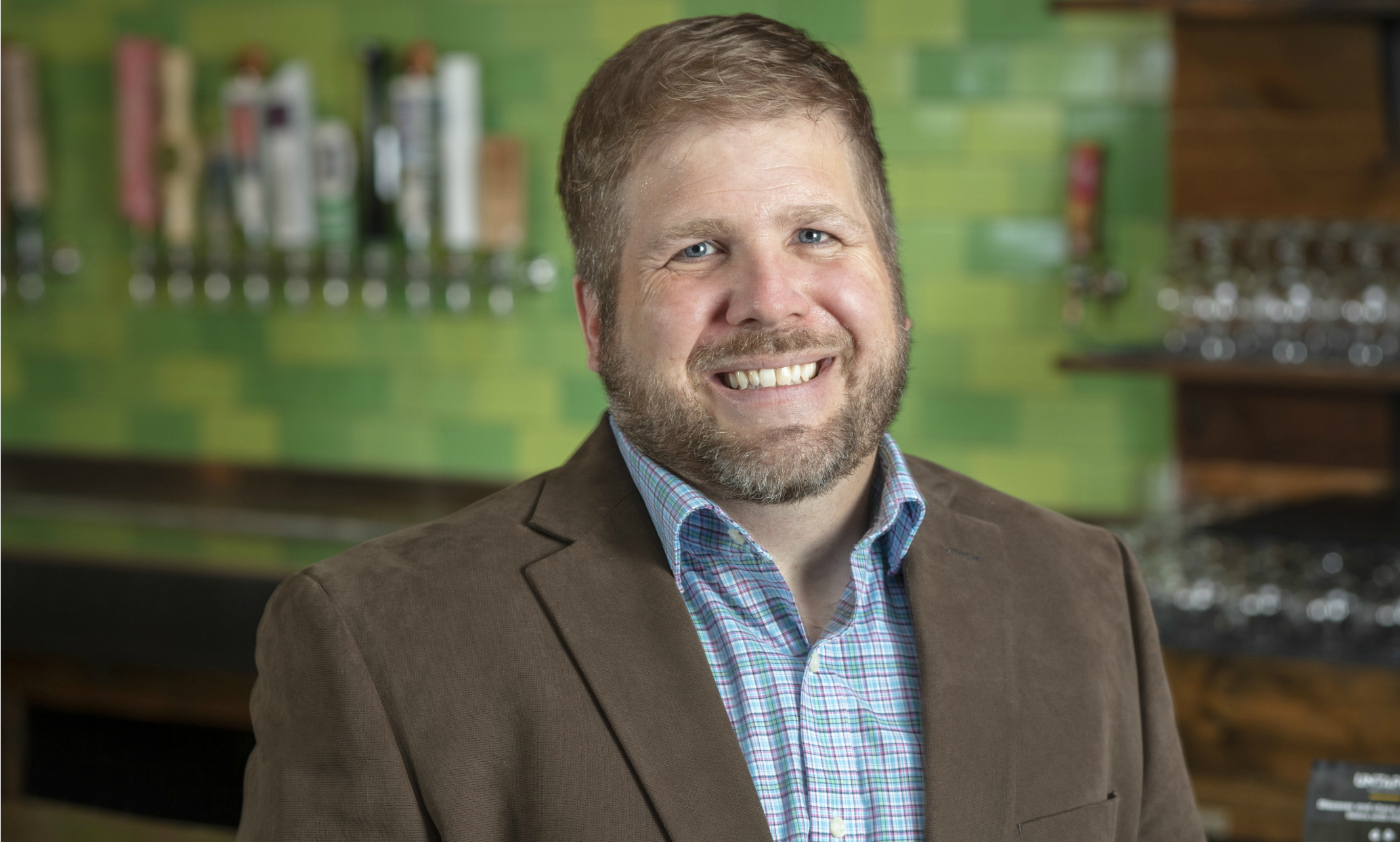
College of Arts and Sciences selects John Couture to receive Alumni Award
Each year, the UMKC Alumni Association recognizes the achievements of outstanding alumni with an awards celebration. The UMKC College of Arts and Sciences is honoring John Couture (B.A. ’96) with its Class of 2020 Alumni Achievement Award.
In 2012, Couture launched Bier Station, the first spot for sampling and enjoying craft beer in Kansas City. In addition to being an award-winning nationally recognized destination for beer enthusiasts, he’s worked hard to make his business a civic asset with an emphasis on giving back to the community. He spoke to us recently about how he's getting by during COVID-19 and his time at UMKC.
How are you coping with the stay-at-home order as a small business owner?
We know many friend in the local restaurant/bar/brewery industry are struggling mightily right now — not just economically, but emotionally. COVID-19 has wreaked havoc among local businesses that oftentimes don’t have the deep pockets of corporations to withstand weeks, let alone months, of shuttered business.
The one thing many of us do have now is time. If you want to support your favorite, local businesses, you can start by monitoring their social media. Can you place a carry-out or delivery order? How about contributing to a Go Fund Me page to support its laid-off staff? Or, purchase a gift card online to provide immediate revenue to the business. Even just a personal note of encouragement and support to a business can mean so much when each day is filled with uncertainty and anxiety.
Your major at UMKC was communication studies. How does that help you in running a business?
Communication is vital to everything we do. Our relationships with breweries are dependent upon strong communications. We try to always be professional, but friendly, and collaborative, which goes a long way to helping keep a business healthy.
How did you come up with the idea for a craft beer shop? How did you put it in motion?
I went to Europe with my best friend in 2006. We were always big craft beer fans, and we really appreciated how laid-back European pubs were. They were much more family-friendly than America. A few years later, I was researching online and saw the craft beer tasting/bottle shop concept that was hot in the Northwest, but not in the Midwest yet. Bier Station was the Midwest’s first craft beer tasting/bar/bottle shop, and we’re definitely known for our family-friendly neighborhood vibe. Selfishly, I also wanted to make sure my daughters would feel comfortable visiting me at work.
Couture, pictured right, stands with representatives from Children's Center for the Visually Impaired as they receive their donation check.
Bier Station maintains an ongoing, community-focused charitable fundraising program. Since January 2017, the pub has raised more than $160,000 for causes ranging from veterans’ programs to animal shelters to suicide prevention – as well as the UMKC Women's Center, Kansas City Athletics and Kansas City’s NPR affiliate station, KCUR. Why is it important to you to support and be active in the community?
Sometimes I still can’t believe I have a job that revolves around beer. I feel very fortunate. I also feel we have a duty to give back to our community. It helps give our staff a sense of pride to know when they come to work and pour a beer for a fundraiser, it’s for a great cause.
What advice do you have for students who’d like to follow in your footsteps?
Be confident, but respectful and always think of others in everything you do. I’ve found that a little bit goes a long way when you take others’ wellbeing into consideration with your everyday work life.
About the Alumni Awards
Join us in honoring Couture and the other Class of 2020 Awardees in our first-ever virtual celebration at 5 p.m. April 16. Go to umkcalumni.com/alumniawards to register for this free event. If you are unable to attend the event but would like to donate to student scholarships, contributions can be made online.
Meet the rest of the 2020 UMKC Alumni Awardees
Feb 26, 2020

An interview with Janet Garcia-Hallett
The Urban Institute recently awarded grants to improve the conditions of prisons in five states including Missouri. University of Missouri System researchers are playing a central role, including Janet Garcia-Hallett, assistant professor of Criminal Justice and Criminology at the University of Missouri-Kansas City.
The 4.5-year research project will be piloted at Moberly Correctional Center, a 1,800-bed minimum/medium-security facility located 35 miles north of Columbia, Missouri. It houses two intensive therapeutic communities for individuals committed to personal growth and sobriety. It provides opportunities for incarcerated individuals to give back through programs such as Puppies for Parole and Restorative Justice. It also offers 48 courses and groups that build skills in areas such as anger management, parenting, employability preparation, cognitive interventions, addiction management and understanding the impact of crime on victims.
We spoke to Garcia-Hallett about the research project.
What got you interested in researching correctional facilities?
It was personal. Growing up in Harlem in the 1980s and 1990s, I saw how mass incarceration affected the community. I saw the adversity my community faced with rampant substance abuse, and when encountering the criminal justice system. I’d see people go missing when they were incarcerated. And I’d see people return home from incarceration, and try to regain stability. I grew up with friends who became wrapped up in the criminal justice system or who were killed or committed suicide as a result of the systemic oppression. Because of this, I became interested in finding ways to address the systematic oppression embedded in carceral systems.
What will your role be in improving the Missouri correctional center? What do you hope happens as a result of your research?
We will work using community-based participatory research — getting involvement from not only those who live there, but also those who work there. The first step will be interviewing and conducting focus groups to inform climate surveys about the prison environment.
I hope that our research will encourage data-driven change and help all people impacted by the system — establishing a more humane and rehabilitative environment for those who live there and also improving the working conditions for those who work there.
Tell us about the book you’re writing.
“Invisible Mothers” (scheduled to publish in 2022 by University of California Press). It’s about mothers who were incarcerated; I interviewed 37 mothers in New York City about their experiences navigating motherhood after incarceration.
I saw much of incarceration research was based on men, and I was interested in researching formerly incarcerated women. Over two-thirds of incarcerated women are mothers, and this book is about them and putting them at the forefront to show how their gender, racial-ethnic background, and maternal roles make their experiences unique. As I’m navigating motherhood myself now, this resonates even more with me.
Who influences you the most?
My mother, Sandra Garcia, who is Afro-Latina. She endured the hardships of Honduras and came to the U.S. to find a better life and to establish better circumstances for her children to excel. She has always motivated me to aim high, to do things for the greater good and to give back to my local community and home country.
How do you influence others?
I’m a first-generation college student, and I list that on my email signature at UMKC – ‘First Gen Proud.’ Many of my students are first gen, too. By seeing that I finished college and went on through graduate school to obtain a Ph.D., this often serves as a source of empowerment. I also find that, as a woman of color, many of my underrepresented students come to me for information, advice or solace, and I am more than happy to serve in this capacity.
Feb 26, 2020
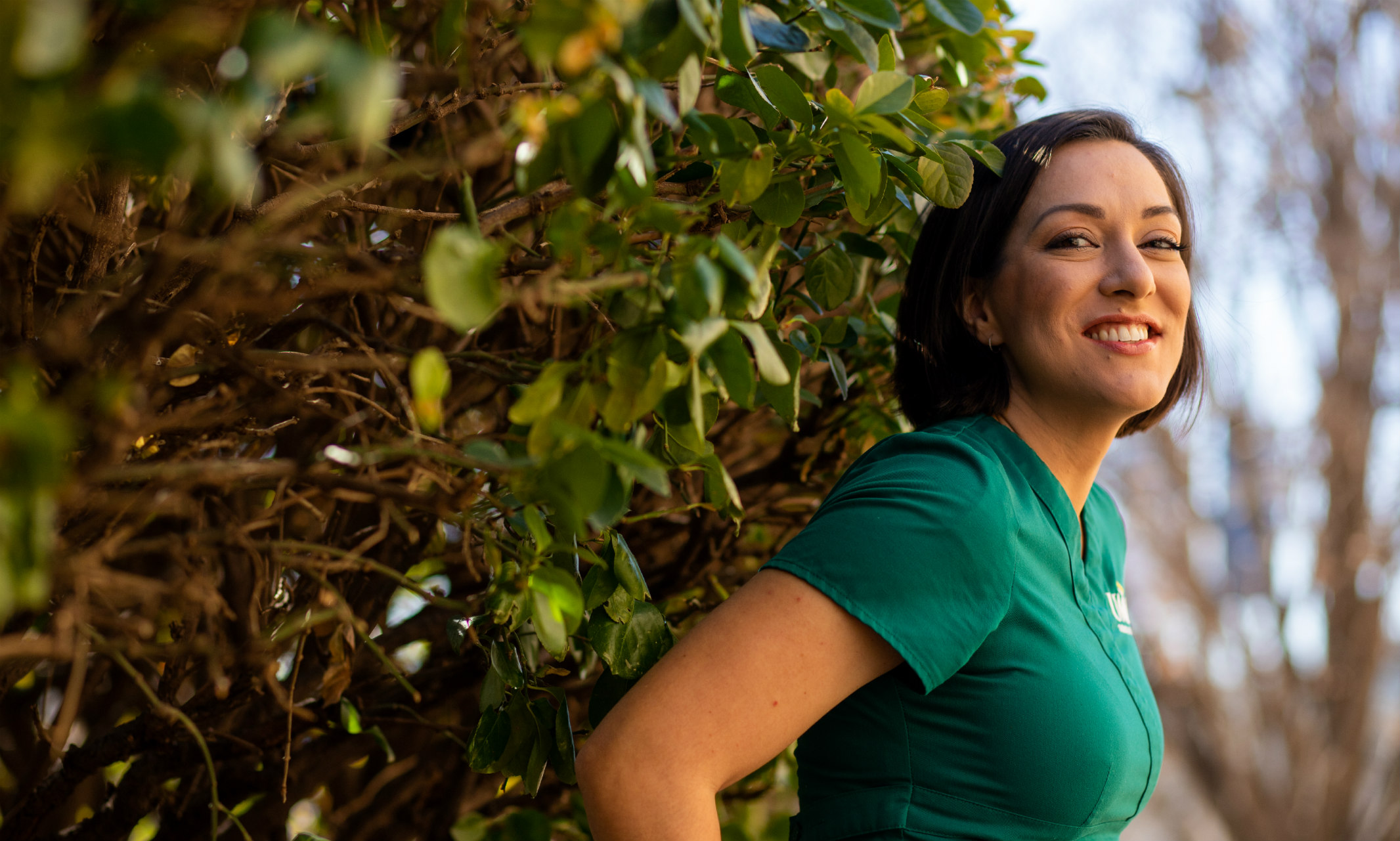
Shanon Black, mother of three, pursues healthcare field to work on reservations
Get to know our people and you'll know what UMKC is all about.
Shanon Black '22Hometown: Lawrence, KansasDegree Program: Doctor of Dental SurgeryHigh school: Lawrence High School
An interest in healthcare and a focus on making a difference for Native American communities led Shanon Black to the UMKC School of Dentistry. While the program is as challenging as she expected, the mother of three is successfully juggling school and life.
Shanon Black knew she wanted to be on the frontline of health care and make a difference for Native American communities. Initially, she was focused on medical school because of the shortage of native doctors on reservations. But one of her professors suggested she explore dentistry.
“I decided to take a look,” Black says. “A representative from the UMKC diversity office visited Haskell University later that week.”
Black, who had completed her associate’s degree, had enrolled in Haskell to finish her bachelor’s degree in environmental science when the youngest of her three children went to school. But it didn’t take her long to realize that her heart was in healthcare. After attending the informational meeting, Black realized that many of her interests were a strong fit with dentistry.
"I could tell that this school cared about the students and not just student numbers." - Shanon Black
“Dentistry is on the frontline of healthcare, which is important to me. And I used to make jewelry and really enjoyed it, so I’m familiar with crafting small objects and the need for perfection.”
That night, Black researched the need for native dentists. At the time there were fewer than 100 native dentists in the United States. According to the American Dental Education Association, of the more than 11,000 dental school applicants in 2018, only 23 were Native American.
“There are never enough Native American dentists to reach all the geographically isolated reservations,” she says. “So there is a great need. After I discovered that, I decided that dentistry was where I needed to be.”
Black shadowed dentists and dental specialists as part of her research to decide if dentistry was right for her. She was fascinated by pretty much everything she saw.
“I learned that dentistry is awesome. I knew I was moving in the right direction.”
She applied to the dental program at UMKC and other schools. After her interview, she knew that UMKC was where she wanted to be.
“Everyone was so enthusiastic, kind and accommodating,” she says. “I could tell that this school cared about the students and not just student numbers. The prospect of dental school was a little daunting, and everyone at UMKC made me feel like I was already family and I hadn’t even been accepted to the program yet.”
Black has discovered that academically dentistry is similar to medical school and challenging on many levels. Last semester she was enrolled in 25.5 credit hours and managing the lab work from three labs.
“It’s a lot of pressure,” she says. “But there are a lot of support programs, too. As intense as it can be, it’s good to know that there is tutoring, administration and peer groups that can see me through the rough times. No one has ever made me feel like a burden when I have gone to them with fears. I have only ever been met with concern, compassion and problem solving. This attention has been vital in navigating the coursework.”
Beyond coursework, the dental program has taught Black a lot about herself.
“I’ve learned that control is an illusion and my fight to be in control is and will always be a losing battle. So I need to be able to roll with what comes my way and stop trying to master plan everything. I also learned that I can’t accomplish my goals alone.”
From staff members to upperclassmen to her fellow classmates, Black is constantly inspired by their dedication and service to others.
“I’m surrounded by people who entered the program to care for people. All of them want to make the world a healthier, happier place for everyone. It makes me want to constantly do better.”
Feb 25, 2020
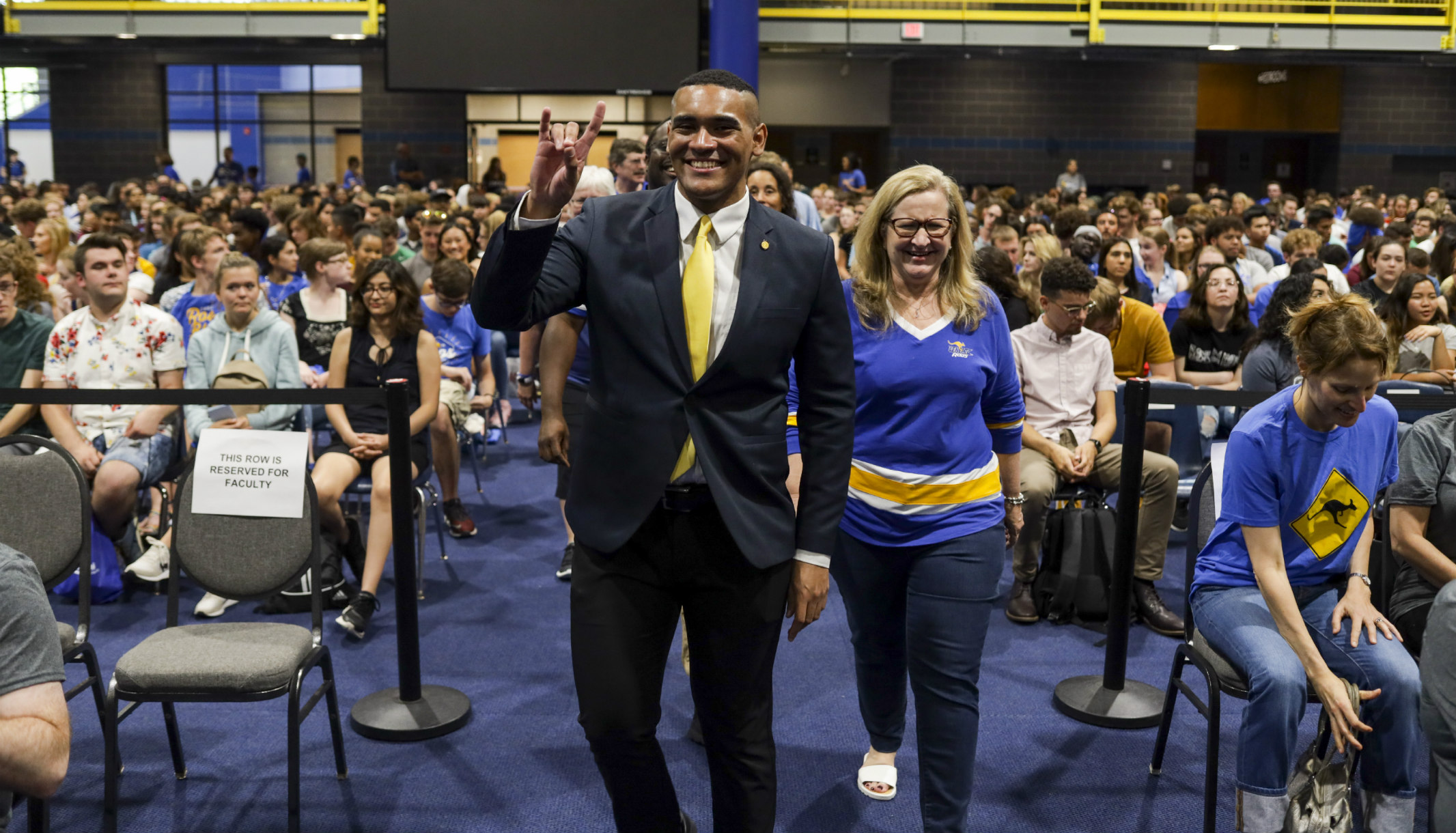
‘Doing something so remarkable that it does not fade from people's minds.’
In celebration of Black History Month, we asked student leaders to reflect on the idea of making history – as opposed to studying or celebrating history.
Participants include:
Jordan Grimmett, president, Men of Color InitiativeHometown: St. LouisAge: 20Major: Six-year BA/MD program at UMKC School of Medicine
Justice Horn, SGA presidentHometown: Blue Springs, MissouriAge: 21Major: Business Management
Alexis Jackson, secretary, The African American Student Union (TAASU)Hometown: St. LouisAge: 22Major: Health Science
Cameron Johnson, president, Multicultural Student Organization CouncilHometown: St. LouisAge: 21Major: Biology
What does it mean to you, personally, to “make history”?
Grimmett: Making history can be attained in countless ways, but there are commonalities between them: inspiring others, making change or doing something so remarkable that it does not fade from people's minds. So, to me, making history means giving back to the less fortunate, staying true to yourself and fighting for what's right.
Johnson: To me, making history means leaving a legacy that people who come after you can use to be better versions of themselves; and to get to places that, before you, they would have a harder time reaching.
Horn: As UMKC’s first multicultural, openly gay student body president, making history means that I represent my community, but also those who came before me. I represent several disenfranchised communities, and representation matters. That is why I make history: to break through barriers in sectors that have never seen anyone from my community.
Who are the people alive today who have made black history? What have you learned from them that you apply in your own life?
Jackson: People like Beyoncé, LeBron James, Barack and Michelle Obama, Oprah Winfrey and Robert Smith have made black history. These major figures have taught me that the sky is the limit and not to hold out on my dreams for anyone.
Grimmett: A few that have inspired me frequently are Barack Obama, LeBron James and Oprah Winfrey. They all have been leaders in their respective careers and have paved the way for others like them to be successful in similar ways. As a future health-care provider, I take these lessons personally because I’m aware of the disparities that exist in certain communities and I know that I will have a strong platform and resources to support and fight for those that are less fortunate.
Johnson: Barack Obama, Nicki Minaj, Beyonce, Jay Z, Simone Biles, Claressa Shields, 50 Cent. What I have learned from them is to raise the bar against all odds. I have also learned to follow your dreams, even if the people around you won't understand at the time.
Do you know anyone personally who you would call a black history-maker? What have you learned from them?
Johnson: Every person that breaks down barriers for people in their family is making black history. We come from generations of overcoming oppression, so yes, if you are doing things that you never thought you could do, then that is black history. Congratulations are in order.
Grimmett: Dr. Kevin McDonald, the vice president for Diversity, Equity and Inclusion at the University of Virginia. I was fortunate to meet him through a program called MOCHA (Men of Color, Honor and Ambition) that strives to provide development in various aspects of life and academics to men of color in high school and college in an effort to increase academic success, retention and future success as leaders.
Horn: I know a lot of people I would call history makers and many of them are here at UMKC, leaders such as Athletic Director Brandon Martin, NAACP President Kayla Pittman, Vice Chancellor of Diversity and Inclusion Susan Wilson, MSA President Cameron Johnson, TAASU President Brandy Williams and many more. Those are people I look up to because they are making history every day.
Why does making history matter?
Horn: For our community to advance and make strides, we must have a seat at the table. When big decisions are being made and/or policy is set, there must be someone from our community representing us and advocating for us. Always.
Grimmett: We need acts of excellence to continue inspiring others to follow their dreams. There have to be leaders and innovators who aren't afraid to take risks for the advancement of mankind.
Do you believe that you will make history? As an individual? As part of a community?
Horn: I believe I will continue to make history because I’m pursuing a career in a profession that hasn’t seen a lot of people like me. I plan on pursuing a career in politics, and my end goal is being Missouri’s first African American governor.
Grimmett: There is not a lot of African American representation in medicine, so in part I hope to make history as an individual, but also make history by building a community of African American physicians that can be the face for aspiring individuals in younger generations.
Johnson: I do believe that I will make history, not because I seek to be famous but because everything that I do is for the benefit of those around me. That kind of dedication to the cause has a good chance at getting recognition, and if it doesn't, that doesn't make the contribution to my people any less historic.
Jackson: I believe I will make history by contributing to our society, by volunteering to make change and helping keep policy makers in office that support all people and recognize their struggles.
What are your goals in terms of making history?
Jackson: My goal is to excel in my career, to let other black and brown girls know that anything is possible.
Grimmett: Graduating medical school and becoming a physician will open many doors. I want to create scholarships and programs that will help increase the population of underrepresented minorities attending college and entering medical school.
Feb 25, 2020
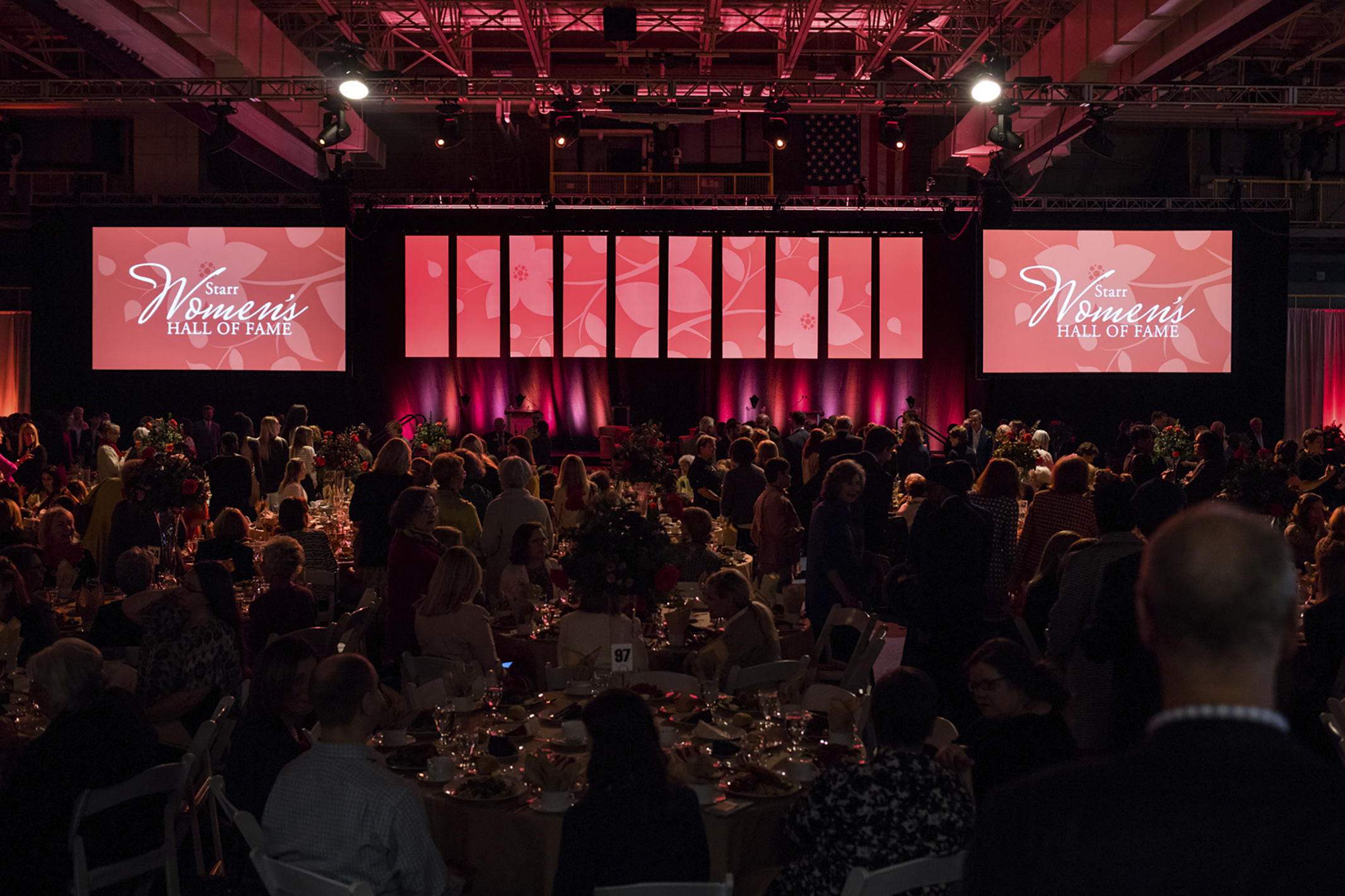
The Starr Women’s Hall of Fame recognizes Kansas City women of distinction
Every two years, an independent panel of Kansas City community leaders selects local women of significance for the Starr Women’s Hall of Fame.
This year, the panel is once again seeking nominations for women with noteworthy ties to the Kansas City area who have historically or more recently made important and enduring contributions in their fields of work.
The nomination form and full directions for making a nomination are available online. The deadline for submitting a completed nomination packet is July 31.
Twenty-six Kansas City women have been inducted into the Starr Women’s Hall of Fame, half of them posthumously. Members of this select group include philanthropists, business executives, women’s and civil rights activists, political leaders and more. You can read more about the inductees online.
The Women’s Hall of Fame is named after Martha Jane Phillips Starr. A Kansas City philanthropist and women's rights leader, Starr was one of the first women to serve on the UMKC Board of Trustees. She played an important role in establishing the university’s Women's Council and the Graduate Assistance Fund, which today provides financial assistance to female students. UMKC’s annual Starr Symposium is named after and endowed by her.
Starr died in 2011 at the age of 104.
The Starr Women's Hall of Fame is funded by her family, the Starr Education Committee and the Starr Field of Interest Fund. It is also supported by 27 leading women’s organizations throughout Kansas City.
Make your nominations for Starr Women’s Hall of Fame by July 31.
Submit a nomination
Feb 24, 2020
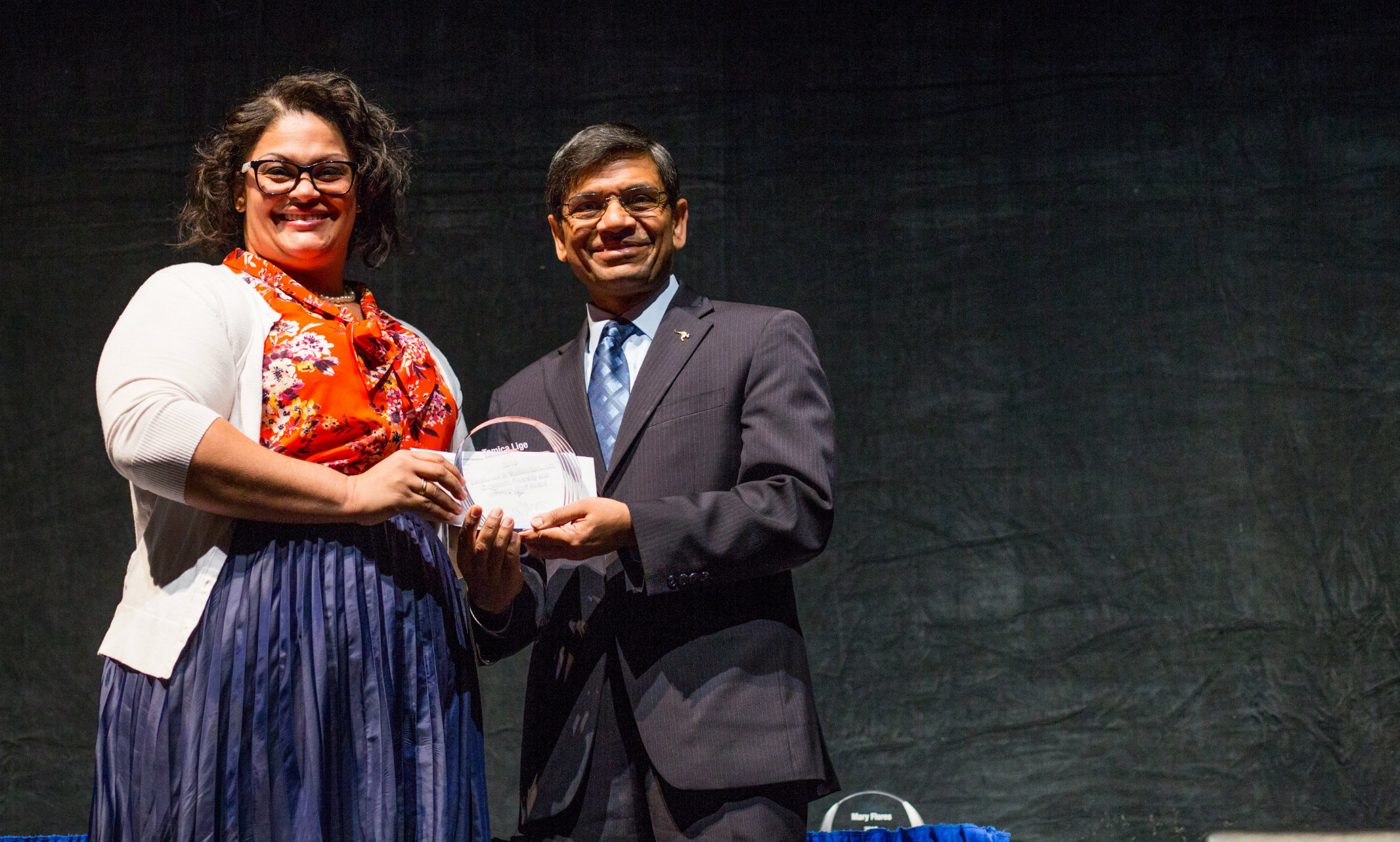
Tamica Lige’s father overcame poverty and discrimination to provide his daughter an avenue to success
Tamica Lige, STAHR program coordinator of diversity at the School of Medicine, feels fortunate to have been inspired by so many people in her life, from her childhood clarinet instructor to writer Toni Morrison. But her biggest influence was her father.
What about your father’s accomplishments inspired you?
My dad, Henry Edward, Lige Jr., was one of six kids who grew up in the projects of Montgomery, Alabama, in extremely impoverished and segregated conditions. He was 11 years old at the time that Martin Luther King Jr. led the Selma to Montgomery march. Dad lived through the civil rights movement, experienced the rampant racism of the Deep South and watched his parents struggle to gain equal rights.
Like so many young black men who come from disadvantaged backgrounds and underperforming schools, my dad saw sports as the ticket that would give him a chance at a better life. He played football in high school and was recruited to play collegiate football at Kansas State University in Manhattan, Kansas.
"Dad lived through the civil rights movement, experienced the rampant racism of the Deep South and watched his parents struggle to gain equal rights."-Tamica Lige
I can only imagine the culture shock he faced with upon arrival to the predominately white town we called home. While in Manhattan, my dad met my mom, a white woman from Shawnee, Kansas, and began his family with her.
My parents came from two completely different worlds. My dad’s family was disgusted with him for dating a white woman, and my mom’s ridiculed her for dating a black man. It was commonplace for my dad and us kids to be addressed with racial slurs by our own family members.
The constant microaggressions, blatant acts of racism and mistreatment could have broken my dad’s spirit, but instead, he used it as fuel to be a better man. He was one of the most kind, caring and accepting people I have ever known. He embraced any and every one he encountered and made a conscious effort to have genuine exchanges of experience with people who were different than him.
My dad overcame so much adversity in the 54 years he walked on this earth that I can’t help but be inspired by him. His soul smiled so bright despite all of the terrible things he had gone through. He was my biggest cheerleader. He was always right there on the sidelines to tell me I could and would be able to do whatever my heart desired.
Feb 24, 2020
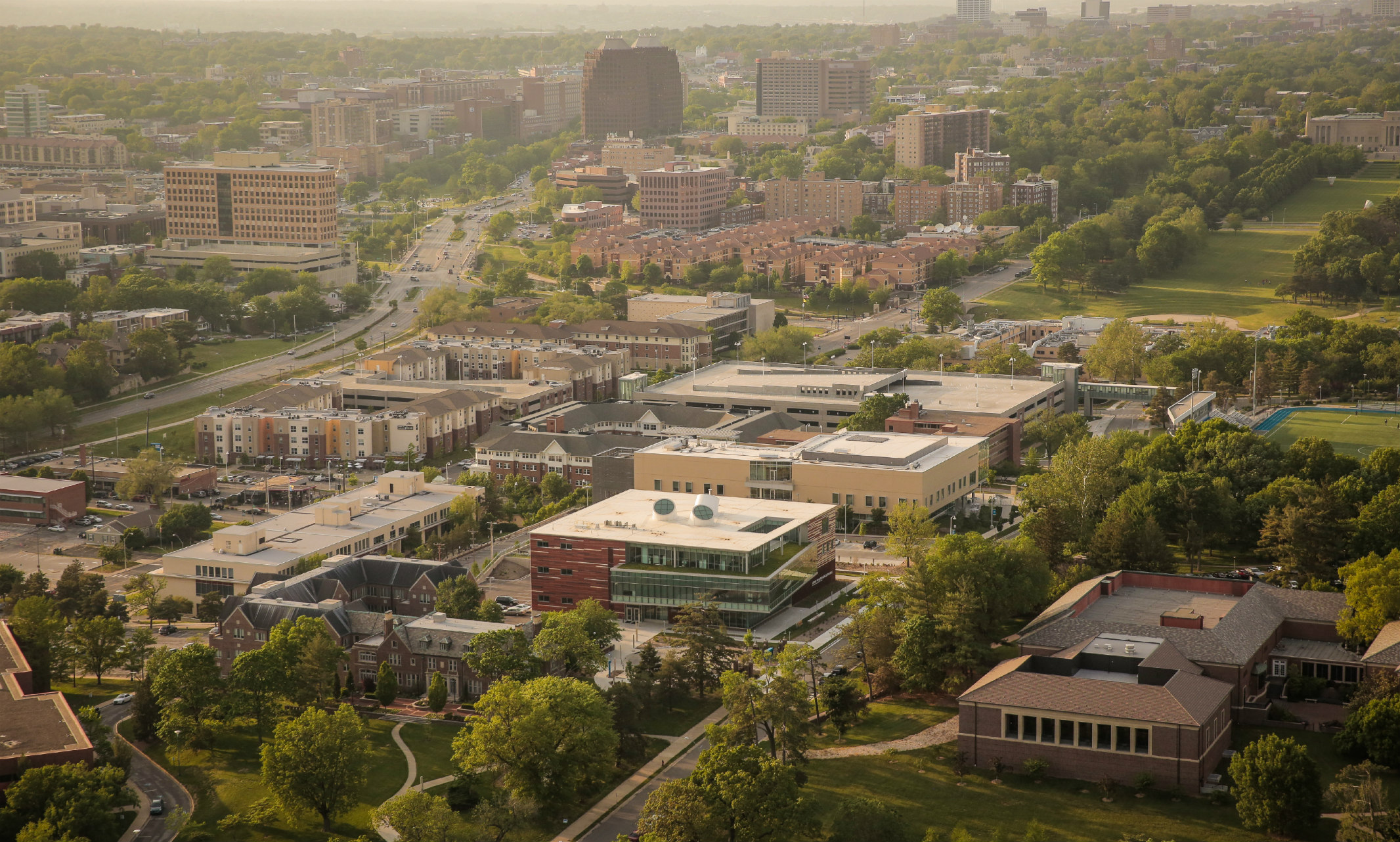
UMKC community encouraged to complete U.S. Census
UMKC – and Missouri – needs your help. March 12 is the first day you can respond to the 2020 census. And for the first time in American history, individuals will complete the U.S. Census online.
The state of Missouri needs everyone to complete the survey. The count impacts federal student loans; federal research grants; campus funding; campus improvements, including labs, buildings and classrooms; health and social services; federal legislation; and students’ future careers. Many professionals working in medicine, social work, nursing, science, research or public health are also heavily dependent on federal funding. College students benefit from federal student loans, legislation, campus funding, campus improvements, and health and social services.
The U.S. Census Bureau has made an internet link available. The department will also mail cards with PIN numbers to be used for filling out the census. People can still answer census questions by mail. By responding to the census, you can help bring resources and representation to your community and campus.
To help ensure everyone is counted, including hard-to-reach communities such as college students, a number of campus and community events will be scheduled. One event will be April 1, which is Census Day. Specific activities are still in the planning stage and will be announced soon.
The U.S. Constitution requires a census every 10 years. The census covers the entire country and everyone living here. The Census Bureau conducts the decennial Census, the American Community Survey, the economic Census and many other surveys and is the leading source of quality data about the nation’s people and economy. Federal funds, grants and support to states, counties, academia and communities are based on population totals and breakdowns by sex, age, race and other factors. Individuals’ data are confidential and federal law protects census responses. Answers can only be used to produce statistics.
The census is also important for redistricting and fair representation. Every 10 years, the results of the census are used to reapportion the U.S. House of Representatives, determining how many seats each state gets.
Quick facts about Missouri
Missouri has nearly 6 million residents, and is the 18th most populated state in the U.S.
338,515 students were enrolled at universities, colleges and community colleges in Missouri in fall 2019.
In 2017-18, 104,364 Missourians were awarded $431,411,598 in Pell Grants based in part on census data.
Census survey data are one factor to determine the funding for many programs in higher education.
Feb 24, 2020
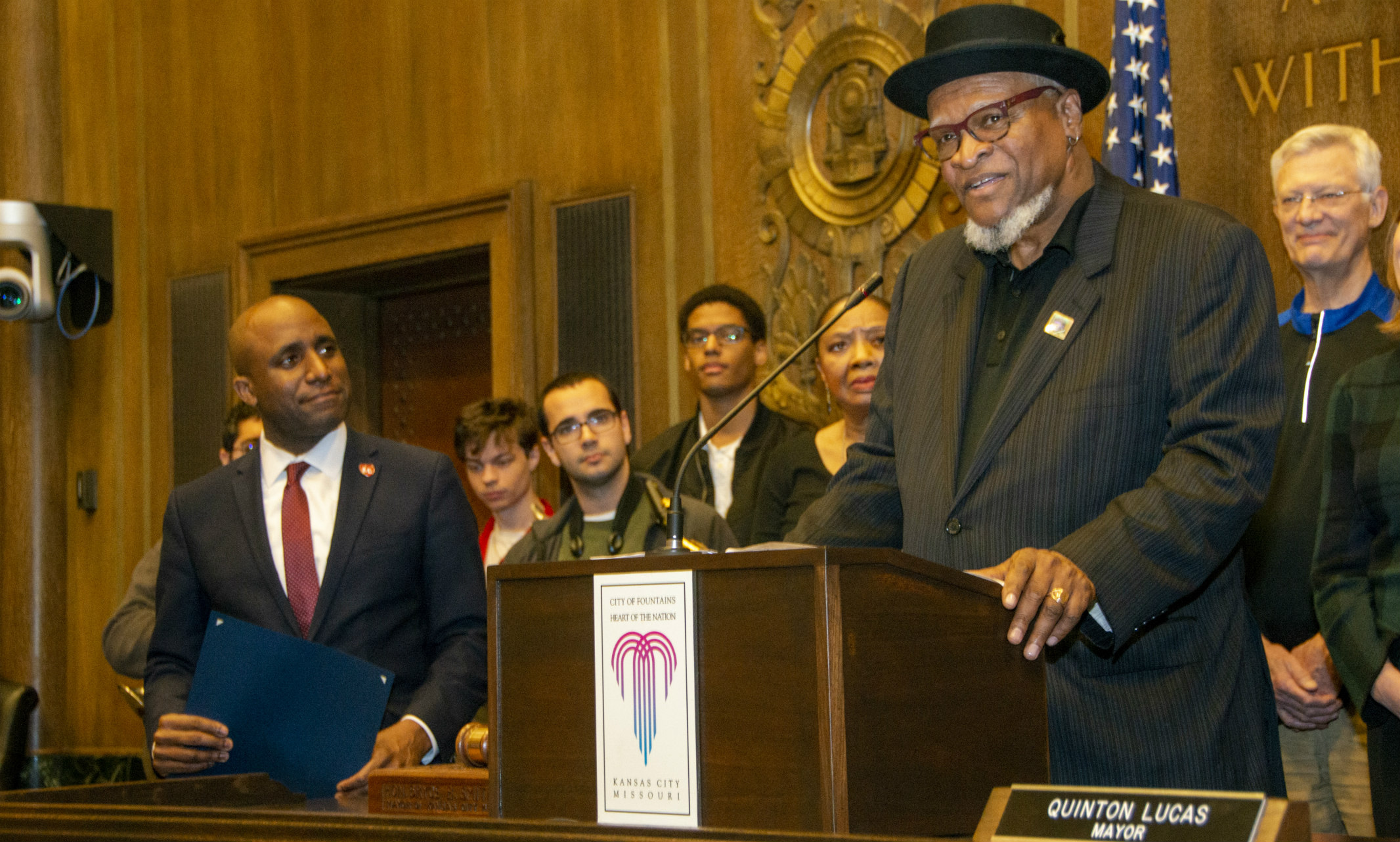
Watson’s father instilled love and respect of music and family
Bobby Watson, renowned saxophonist and retired UMKC jazz studies professor, grew up with four brothers all one year apart. His father, who quietly and consistently taught his children to create an interesting life and value their relationships with each other, has been his lifelong inspiration.
Kansas City Mayor Quinton Lucas and the Kansas City, Missouri City Council issued a resolution for Watson at the Feb. 27 meeting. The resolution stated: “Honoring Bobby Watson on the occasion of his retirement for his twenty years of dedicated service to the Conservatory and UMKC as the Distinguished Professor of Jazz Studies.” He thinks his father’s influence was critical to his success.
Who was one of your greatest inspirations when you were either a child or young man?
My father. He flew airplanes and taught pilots to fly at ground school for the Federal Aviation Administration. He was an artist and an inventor – he held patents on several of his inventions. But everything centered on his love of music. He played saxophone in church and at home. He would stand in a corner and play because he thought the sound was the best there.
What about his accomplishments inspired you?
He wasn’t a boastful man. He taught us humility. As young black men he wanted me and my four brothers to be good public speakers, so we had Toastmasters at home. We stood at a podium and spoke with no microphone.
"He really taught me how to listen."-Bobby Watson
He kept us safe. When we wanted to play basketball, he built a basketball court for us and our friends at home. When we wanted to play pool he put a pool table in the basement so we wouldn’t go to pool halls. When we wanted to ice skate, he made a skating rink in the yard.
Usually, I thought he was right. There were five brothers in my family and he taught us that you don’t fight with your brother.
Once when we were young, I got in a tiff with one of my brothers. He told us to sit on the sofa and hug each other. Then he went out to cut the grass. And then he trimmed the bushes. Then he stopped and fixed himself a glass of lemonade – all while we were holding each other looking out the window and crying and wondering when he was going to let us let go. We didn’t fight after that.
How have you incorporated his values into your life?
He really taught me how to listen. When I talk to people, I listen. If you’re thinking about what you’re going to say next, you’re not listening. I don’t want to go back and forth like you see today. I’ll talk, you listen. You talk, I’ll listen.
Feb 24, 2020
Five interdisciplinary RJI Student Innovation Competition teams tasked with developing tools to fight against deep fakes and fabricated content pit...
UNEWS - Digital media has made all sorts of information increasingly accessible, and as a result, the deliberate spread of disinformation has become an increasingly important issue.
Known by the relatively new term “fake news,” this false information rose to prominence during the 2016 election, with governments and internet companies desperately making efforts to fight it.
Fortunately, students in the UM system are now working to combat fake news by creating programs that can recognize fabricated photos, videos and audio. Students developed verification software as a part of the Student Innovation Competition at the University of Missouri’s Reynolds Journalism Institute (RJI). Read more.
Feb 21, 2020
Two School of Computing and Engineering teams pitched their ideas for fighting fake news during the University of Missouri School of Journalism’s D...
Columbia, Mo. — A web-based tool known as Deeptector.io, which harnesses artificial intelligence to detect synthetic or deepfake videos and images made with AI, won the 2019-20 Missouri School of Journalism’s Donald W. Reynolds Journalism Institute student innovation competition and a $10,000 prize.
Defakify won second place and $2,500, while Fake Lab received $1,000 for third place. Deep Scholars also participated, but did not place in the competition. Read more.
Feb 21, 2020
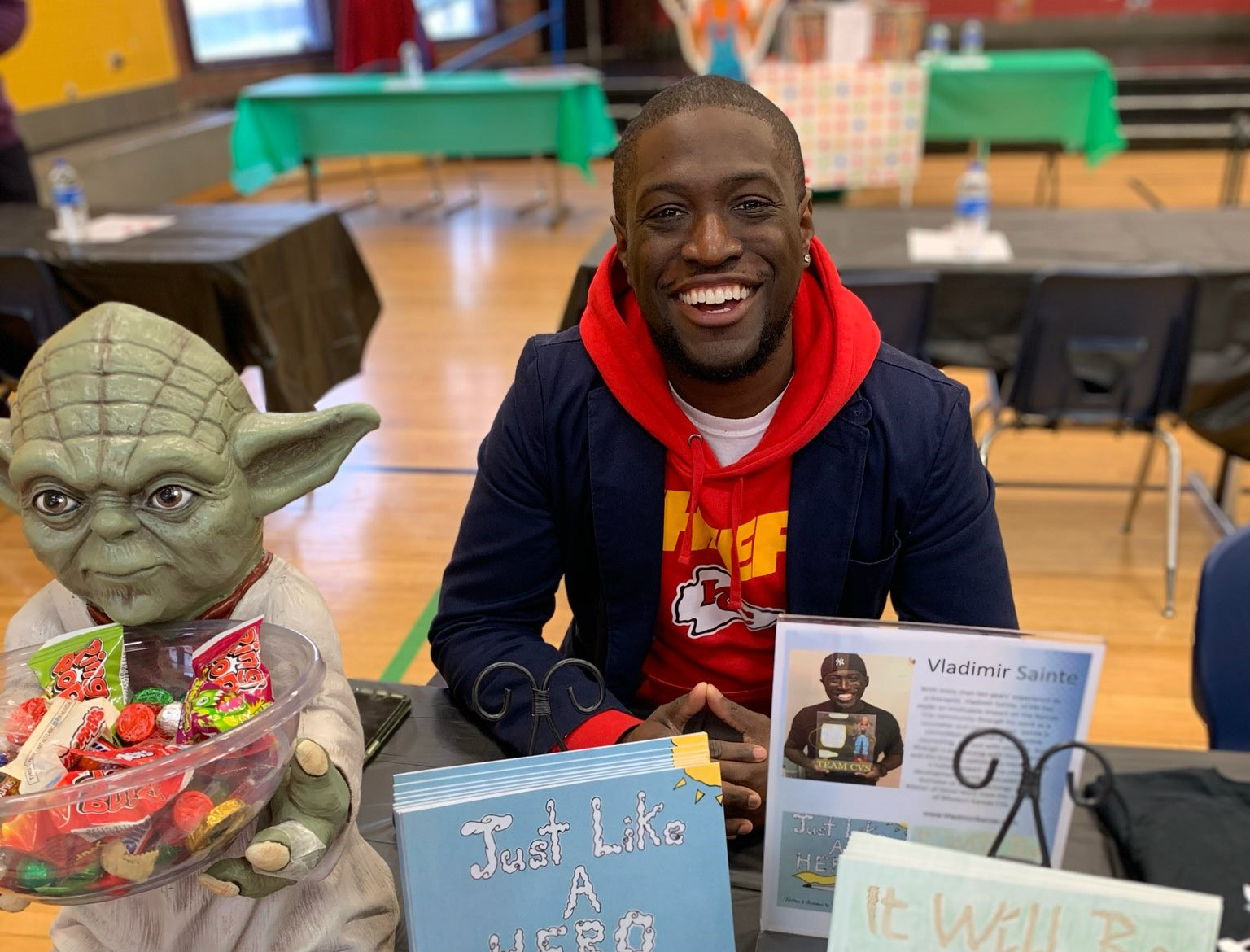
Alumnus Vladimir Sainte addresses mental health in children through writing and social work
Our ongoing story starts with people from around the world, converging here at UMKC. Get to know our people and you'll know what UMKC is all about.
Vladimir Sainte, LCSW
Hometown: Queens, New York
UMKC degree program: B.A., sociology ’07, Master of Social Work ‘10
Vladimir Sainte is helping children by carrying forward the mentoring he received as a young man. Originally from Queens, New York, his mother sent him to live in Kansas City with his uncle, William Jacob, hoping he would be a good mentor for Sainte. Her strategy was a success; Jacob instilled a love of learning and a desire to give back.
Could you tell us a little about your work?
I’m a team leader for client care in mental health at Truman Behavioral Health, and worked previously as a counselor and crisis clinician. I also write children’s books to create inclusive literature to increase awareness of diversity and tolerance.
Why did you choose this career/field?
As an undergraduate, I knew I wanted to get my master’s degree. I took Introduction to Social Work with Grey Endres. He’s this great guy who wears Hawaiian shirts and superhero belts to class. He showed me that social work can be a profound and beautiful career – where you get to play with kids all day!
"With power comes great responsibility."-Vladimir Sainte
How did you become an author?
I was working with a black boy who was struggling with his identity. I was looking for a book that might help him and I couldn’t find anything, so I decided to write one myself. I wrote “Just Like a Hero” – a story about Will, a black boy who is coping with daily struggles – to highlight the importance of personal value. I didn’t expect it to escalate, but I’m happy it’s been recognized. My books are designed as a reminder of how important we all are.
The other reason I focused on a young black boy in my first book is because I wish I’d had something like this growing up. Throughout my career, I’ve seen that some people in the African American culture can treat mental health issues as taboo. If we know someone who has mental health issues – that person is crazy. We don’t talk to them. It’s like a plague. And we act as if we ignore it, maybe it will go away.
I wanted to reach diverse backgrounds through boys or girls who look like me.
"We need to accept people as they are – shine the flashlight on that – and let them know if things are difficult that it’s not going to be this way forever.”
What did you most appreciate about UMKC?
Meeting my wife, who was in the social work program with me. We were friends first. She has been my rock and my pillar through my career and my books. I can be in the clouds – she is analytical. She’s instrumental to my process.
How did UMKC and your UMKC connections help prepare you for your career?
Elaine Spencer-Carver, School of Social Work’s director of field education, saw the potential in me. I saw Grey Endres as a mentor. He taught my last undergraduate class and I told him I’d applied to the MSW program. He helped place me in my practicum at Gillis Center my last year in the program and it became my first job.
Do you have a personal motto or words you live by?
I love comic books, and Spiderman’s motto has always resonated with me.
“With great power comes great responsibility.”
As a social worker, I am an agent of change – that has great power. Kids learn through their environments. If we’re stressed, they feel that. We need to show acceptance, support and compassion. We need to accept people as they are – shine the flashlight on that – and let them know if things are difficult that it’s not going to be this way forever.
Who has been a great influences in your life?
My uncle, William Jacob, who was an engineer in Kansas City, was very influential. When I was a 16-year-old kid living in New York, I hung out with kids who weren’t interested in school. I wasn’t interested in school. I had terrible grades and was searching for connection, which I found with the wrong group of people. He and my mother came up with the plan for me to move to Kansas City so he could mentor me. He saw my potential, even though I didn’t. Every Tuesday night after watching The Andy Griffith Show, he’d sit down with me to do one hour of algebra. I hated it, but he pushed me. He made me enjoy education. With his influence, I saw a future for myself.
"Every Tuesday night after watching The Andy Griffith Show, he’d sit down with me to do one hour of algebra. I hated it, but he pushed me. He made me enjoy education. With his influence, I saw a future for myself.”
How are you now using your influence to impact others?
I hope I’m helping to break down the stigma of mental illness by raising awareness in children. For me, that’s through creating books that talk about mental health. It’s important for kids to understand that it’s OK to be anxious or depressed, but you have worth. You are important. Mental health struggles don’t signify or create a boundary. My first book, “Just Like a Hero,” is about a young black boy, and the second, “It Will be Okay,” is about a Latina girl. The third and fourth books also feature children of color with their own challenges.
Recently, I spoke at Turner Middle School. A girl came up to me after my presentation and thanked me. She said she’d struggled with feeling sad for herself, and that she doesn’t feel important. My presentation helped her understand that she can talk about that. It was breathtaking to hear.
Feb 19, 2020
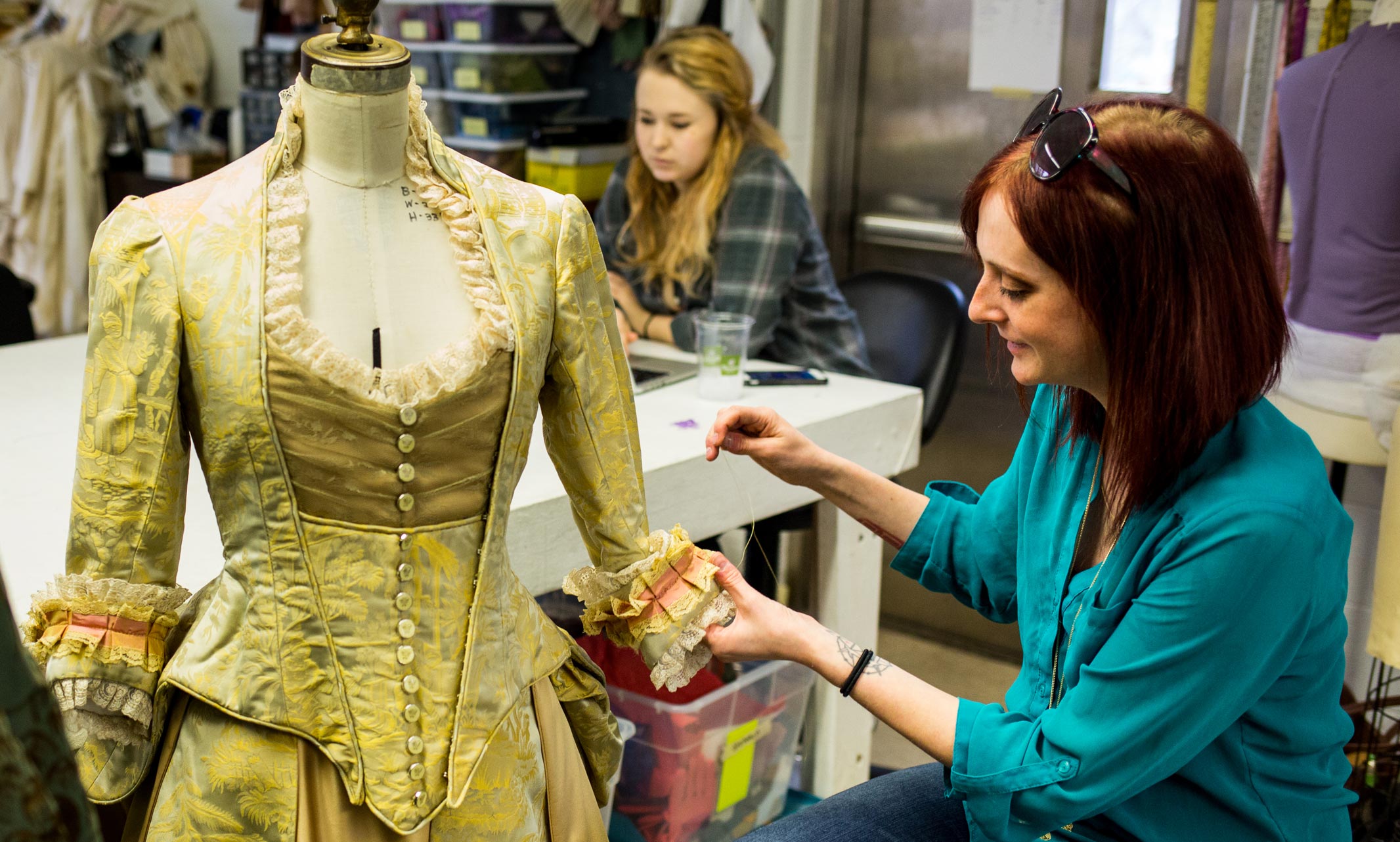
Hollywood Reporter names UMKC to its Top 10 list
For the third year in a row, Hollywood Reporter has included UMKC Theatre in its list of Top 10 Costume Design schools.
“Many incoming grad students think that they can only have significant training and careers on the coasts,” said Lindsay W. Davis, UMKC Theatre professor of costume design. “Three times in a row validates our training program, because we already know that all our graduates work in the entertainment industry.”
UMKC Theatre offers a single comprehensive M.F.A. degree in costume design and technology, which has been key to its success. Students learn many skills including drawing, painting, sketching and learning how to construct a garment with techniques in fabric manipulation, millinery, tailoring and pattern drafting.
Doug Enderle was the first M.F.A. costume design graduate from UMKC in 1981. He received an Emmy for his work as a senior lead costume designer for The Walt Disney Company. Other notable alumni include Tom Houchins, costumer on ABC’s “Grey’s Anatomy;” and Jonathan Knipscher, lead tailor on the Hugh Jackman film “The Greatest Showman.” Pheobe Boynton (M.F.A. ‘08) is a freelance costume designer and technician. She was costume supervisor on the Norwegian and Oceania cruise lines; and also designed for the Discovery channel group, YouTube Red, The Los Angeles Opera, Kanye West, Kansas City Repertory Theater, Legendary Digital, Relativity Media and Theatrical Arts International.
Here’s where other UMKC Theatre graduates are working: HBO, The Metropolitan Opera, The Los Angeles Opera, on Broadway, London’s West End, the Market Theatre in South Africa, as well as opera companies in Brazil, Italy and throughout the U.S. Recent graduates have worked at regional theatres such as Ford’s Theatre in Washington, D.C., The Roundabout Theatre in New York City, The Cleveland Play House and The Old Globe in San Diego.
Feb 17, 2020
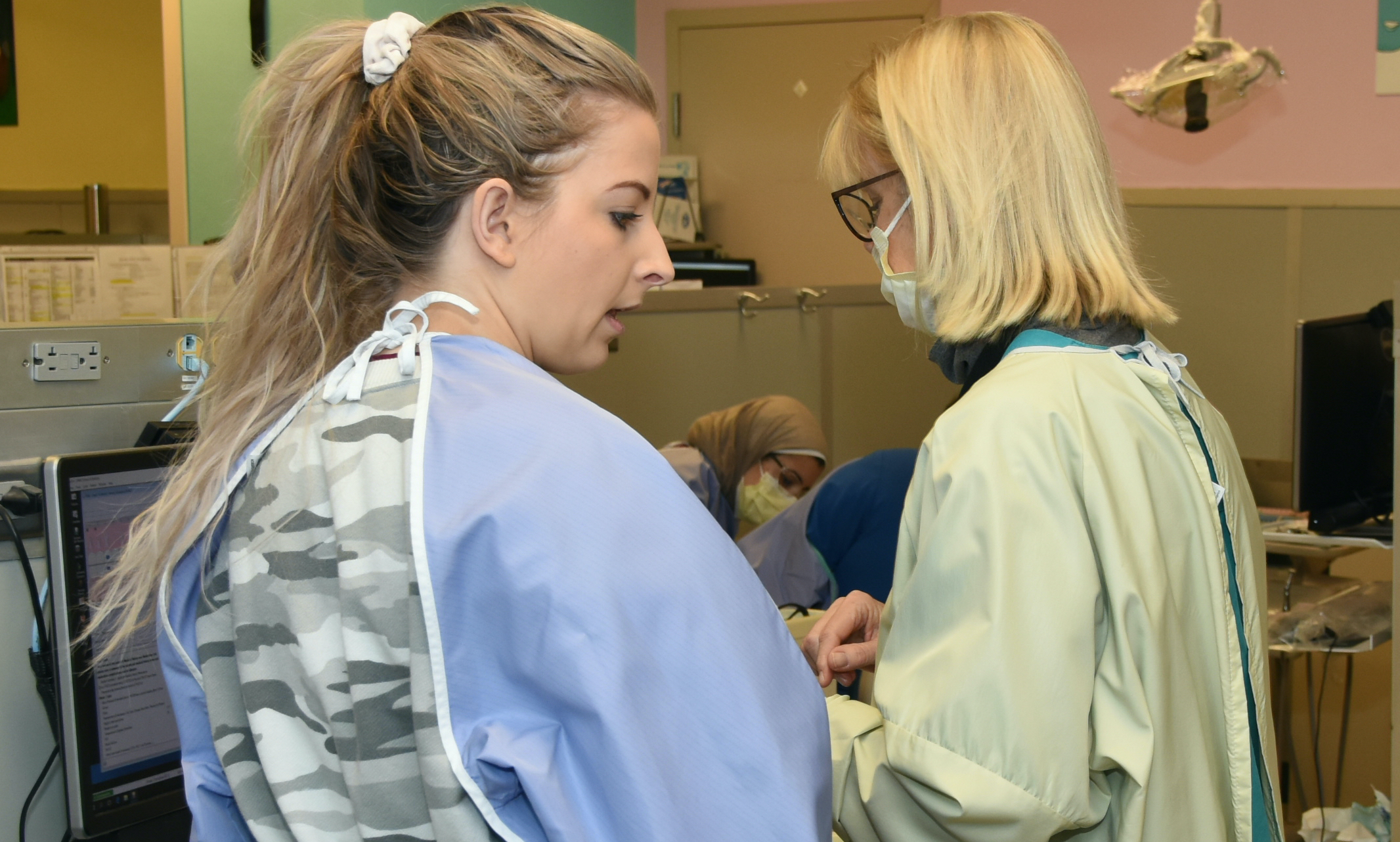
Half-off prices on many basic procedures now are available for anyone with a valid UMKC student ID
The pace and costs of college can make getting good, affordable dental care seem daunting, but at UMKC, the School of Dentistry can help. Services at the school’s clinic often cost less than what private practices usually charge, and now the school is offering further discounts to UMKC students.
“University students often avoid visiting the dentist for financial reasons,” said Yasmin Hussein, a fourth-year dental student. “However, what many UMKC students do not know is that UMKC’s dental clinic provides very affordable prices for dental care. UMKC students receive a 50 percent discount on top of the already low prices, not to mention the convenient location and excellent facility.”
The added discounts for students, which started this semester, offer a basic evaluation with X-rays for new patients or an emergency visit for just $10 and, as Hussein noted, half off any further basic services needed, such as taking care of a cavity.
Hussein’s classmate, Rachel Slenker, also agreed that the clinic’s location, just a few minutes north of the main campus, was ideal for busy students.
“The dental care they receive is very thorough,” Slenker said. “Because it's a learning environment, all of our work is getting checked by a dental professional, sometimes multiple. Many of my patients have said our close attention to detail and the ‘many eyes that see their teeth’ are the main reasons for attending the clinic.”
“I have worked with several dental students who are seeing UMKC students receiving the new discount. They are so grateful to be able to take care of their dental needs at an affordable cost.” — Linda Seabaugh, DDS, clinical assistant professor
One of their supervisors, Linda Seabaugh, DDS, said it was particularly rewarding seeing her students provide care for other students.
“I’ve seen many UMKC students come through the clinic, but one stands out to me,” said Seabaugh, a clinical assistant professor and director of ergonomics at the dental school. “He was a patient of one of our students and had quite a bit of dental work done. He would have benefitted greatly from reduced fees at that time. As it turns out, he is now a first-year dental student. He already has a unique perspective as a dental school patient, which will serve him well when he sees his own patients.”
Seabaugh, who taught at the school in the 1990s and returned about three years ago, added, “I have worked with several dental students who are seeing UMKC students receiving the new discount. They are so grateful to be able to take care of their dental needs at an affordable cost.”
The clinic’s patients get high-quality care at a good price, and they help the next generation of dentists prepare for their careers.
“Most of my time is spent working with students in the clinic as they treat patients,” Seabaugh said. “The clinic is a critical element of dental education … when dental students transform into dentists. It is amazing to watch how much the students learn and how their skills develop. Not only do they advance their knowledge and skills, they provide much needed dental services to members of the community, many of who would not otherwise be able to afford dental care. In addition, our students have the privilege to work with many diverse individuals and apply our core values of excellence, compassion, integrity and justice.”
Affordable Dental Care for UMKC Students
$10 – Initial screening, examination and X-rays for new patients only
$10 – Emergency visit
50% off – UMKC’s already low prices (does not apply to care in Advanced Education Program clinics)
Call 816-235-2100 for an appointment. More details on the program are here.
Feb 13, 2020
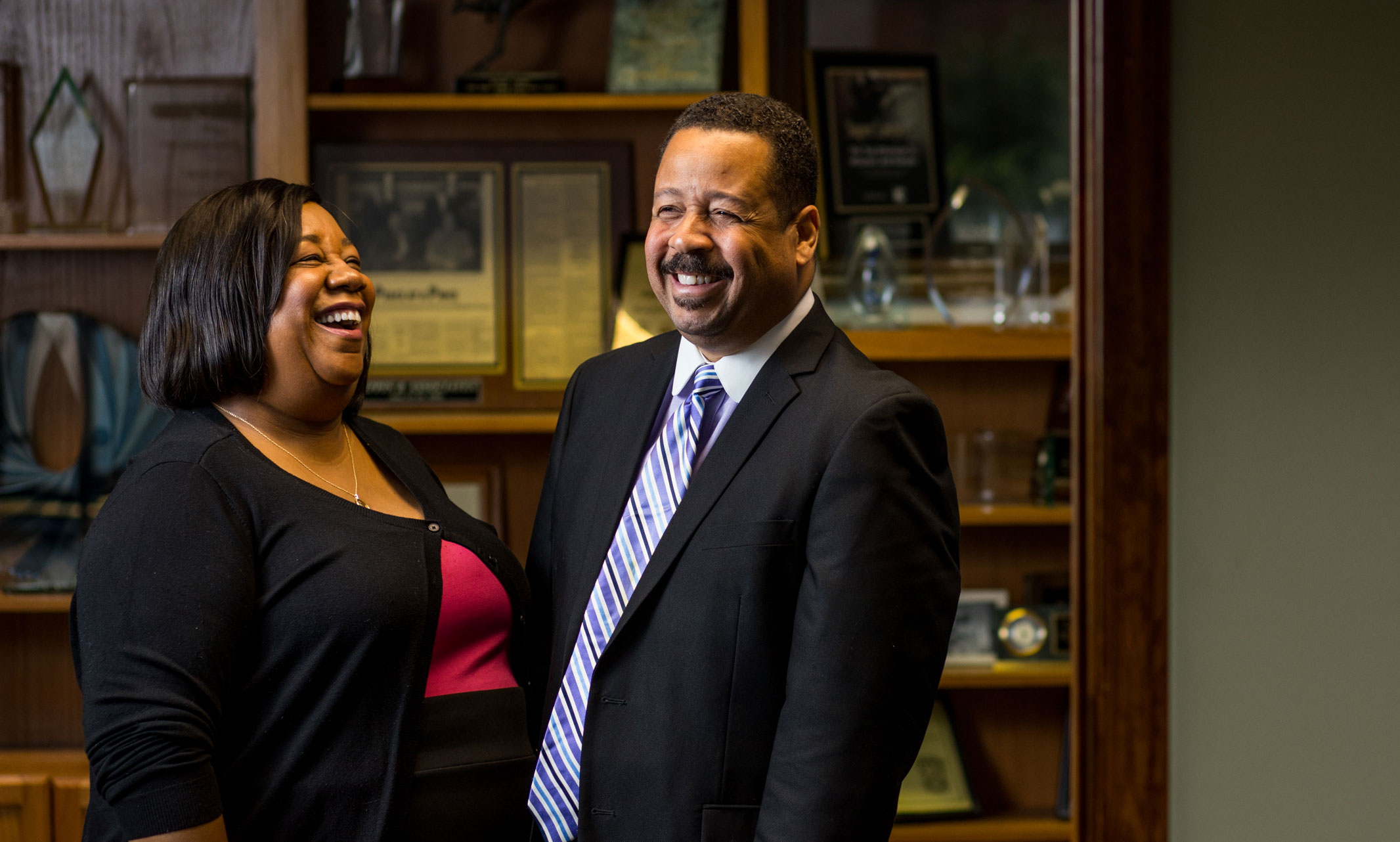
Law graduates navigate work and love — at home, at the office and on television
If you ask Dana Tippin Cutler (J.D. ’89) and Keith Cutler (J.D. ’89) whether they thought, in their wildest dreams, they’d ever have their own television show, they’d tell you “heck no!”
In fact, Dana says when she first got the call from a production company several years ago looking for a husband-and-wife team to preside over a new courtroom TV show, she hung up.
“I thought it was a joke. I have a friend who likes to jerk my chain and I thought he was pranking me,” Dana says. She didn’t buy it until the production company called back and confirmed they were not, in fact, pranking her.
Dana was sure her husband, Keith, wouldn’t go for it, but to her surprise, he agreed to learn more. Two years later they’re the hosts of the Emmy-nominated daytime TV show Couples Court with the Cutlers, the first time a married couple has ever presided over a TV courtroom.
Finding the balance in law and love
Couples Court with the Cutlers specializes in, you guessed it, couples — helping them find resolutions and move forward. The Cutlers travel back and forth to Atlanta, where the show is filmed, several times a year to shoot new episodes. This allows them to keep up with a demanding TV schedule while still managing the family law practice they manage with Dana’s father and another associate.
On the show, the Cutlers are given a little more leeway than regular courtrooms allow; they’re able to laugh and keep up their natural banter, show expression when they hear wild stories and provide real advice to the couples standing before them.
On the show, they draw from their experiences practicing law, but also from practicing marriage.
Left: The couple on their first date during college in Atlanta, Georgia. Right: Keith and Dana on their wedding day in 1989, at the Second Baptist Church in Kansas City.
“As lawyers, you learn a lot with different experiences, and the trial work we do in our regular jobs has trained us to think on our feet. We were building up for the show and didn’t even know,” Keith explains. He adds that after 37 years of being together — or as Dana puts it, joined at the hip — “we know a little something about relationships.”
The Cutlers met in the 1980s while getting their undergraduate degrees in Atlanta — Dana attended Spelman College and Keith attended Morehouse College. They have enjoyed joking and pestering each other ever since.
Despite living and working together every day, the Cutlers say they don’t think that’s too much time together. They truly enjoy each other’s company.
“We’re like the columns of a church. They’re working together but not on top of each other,” Dana says. “We have different hobbies and interests at home, and when we’re in the office we’re working on different things as well.”
Dana works primarily as an education attorney, representing charter schools, while Keith works as a civil defense trial attorney.
Keeping a community focus
The Cutlers don’t think of themselves as celebrities, but their unique job does require them to occasionally play the autograph-and-selfie game at the movies or the grocery store. Most times, the Cutlers say, people are just surprised to discover that two of their favorite TV stars live in Kansas City. The show currently airs in more than 100 U.S. television markets, and episodes are also available on YouTube.
Dana and Keith on the set of their TV show, Couples Court with the Cutlers.
Kansas City is important to the Cutlers, though, not just because they live and practice law here, but because they care about the community and being civically engaged.
“At UMKC, they stressed being a good lawyer for the community,” Keith says. “One of the best things about UMKC is their emphasis on the practical side of law, which contributes to the learning experience that a lot of students don’t get until after law school.”
As you can imagine, the Cutlers are big supporters of the UMKC School of Law. Both have been honored with the school’s Alumni Achievement Award — Keith in 2008 and Dana in 2018 — and Keith is an adjunct professor. It’s important to them to help young lawyers achieve the same level of success they have, wherever that may be.
“We’re like the columns of a church. They’re working together but not on top of each other. We have different hobbies and interests at home, and when we’re in the office we’re working on different things as well.” —Dana Tippin Cutler
“I didn’t appreciate how accessible and relatable the faculty were at UMKC until I realized that law school wasn’t like that for everybody,” Dana says. “It’s the same thing we enjoy about the judges we work with in Kansas City.”
Their advice for future attorneys? A law degree is one of the most versatile degrees you can have. Even if you don’t want to go to court, which is one small part of the job, there are plenty of other things you can do.
A TV show, perhaps?
This story originally appeared in the UMKC magazine, Perspectives, vol. 29.
Feb 13, 2020
Editor-in-Chief Robert Stewart is bringing 44-year career to an epilogue
As critically acclaimed longtime editor Robert Stewart prepares his final issue of New Letters, successor Christie Hodgen, Ph.D., reflects on the past and future of the award-winning UMKC magazine and its publishing house partner, BkMk Press.
New Letters was founded just one year after the University of Kansas City, which became UMKC, Hodgen said, “so it might be said that in a sense, we are the most enduring living artifact to the university’s intellectual life and ambitions.”
The English department faculty member makes a compelling case for her bold assertion. Indeed, New Letters has published some of the nation’s greatest 20th and 21st century authors, including J.D. Salinger, e. e. cummings, Marianne Moore, Pearl S. Buck. Edgar Lee Masters and May Sarton. In 2008, Stewart was awarded the magazine industry’s highest honor, the National Magazine Award in Editing. The magazine has regularly placed original work in the highly regarded annual award anthologies the Pushcart and Best American. Together with partners BkMk Press and New Letters on the Air, it is the only literary enterprise in the country boasting not only a magazine and book press, but also a weekly radio program.
“It might be said that in a sense, we are the most enduring living artifact to the university’s intellectual life and ambitions.” - Christie Hodgen
Hodgen credits Stewart for the magazine’s ongoing sterling reputation.
“Robert Stewart has worked for New Letters magazine for more than forty years. As editor-in-chief for the last eighteen years, he has not only maintained but in fact furthered the magazine’s reputation for excellence,” she said. “Under the surface of these awards—which are flashy and exciting—is an almost monk-like devotion to the work. A tremendous amount of care is given not only to the selection of the content for each issue of the magazine, but to the integrity of its presentation. Bob is publishing with posterity in mind.
“It is worth mentioning, too, that Bob is also an accomplished poet and essay writer, with multiple critically acclaimed books of poetry and essays to his credit. Like many great editors, his eye for talent is so honed because he possesses so much himself.”
“The magazine’s mission is to ‘discover, publish, and promote the best and most exciting literary writing, wherever it may be found’ and frankly, I can’t think of a better job.” - Christie Hodgen
New Letters and BkMk play a significant role in the university’s educational mission. Working with the departments of English and Communication Studies, they offer UMKC students internship opportunities in magazine and book publishing, and radio production.
“These internships have introduced countless students to the skills they require to enter the workforce as editors, writers, publishers, and producers,” she said.
Stewart praised the choice of Hodgen as his successor.
“After spending 44 years on the staff of New Letters—the latest 18 as editor of the magazine, press, and radio series—I am heartened, relieved, and overjoyed to know that UMKC literary publishing and broadcasting will be led by someone I so much admire,” he said. “Christie Hodgen is a great writer, herself; her love and understanding of literary art will reshape and invigorate our work.”
Hodgen recognizes the weight of responsibility she is taking on, to students, to the community and to American literature.
“We are an important part of the arts community here, sponsoring and co-sponsoring a number of prizes and readings, and hosting the region’s most robust calendar of literary events,” she said. “The magazine’s mission is to ‘discover, publish, and promote the best and most exciting literary writing, wherever it may be found’ and frankly, I can’t think of a better job. I am looking forward to both continuing to publish the voices that already make New Letters a great magazine, and also scouring through the slush pile to discover new voices.
“We really do read all submissions, hoping to discover and promote those new voices.”
She is looking to add more than just new voices.
“First and foremost, I see my job as maintaining the magazine’s tradition of excellence. In addition, I am undertaking a project of digitizing our 86 years of back issues, with the hopes of being able to host these online, making our rich history available to the public,” Hodgen said. Readers can also look forward to a user-friendly digital version of the magazine.
New Letters is a not-for-profit entity that depends on donations for a share of its funding.
Feb 13, 2020
Need free work done on your teeth? UMKC dental school is looking for you
The School of Dentistry at the University of Missouri-Kansas City was featured in the Kansas City Star while needing a few good — or not so good — mouths for student's clinical exams.
Fox4KC also highlighed how patients could be eligible for free dental work and cleaning while helping UMKC dental students earn their degree.
Feb 13, 2020
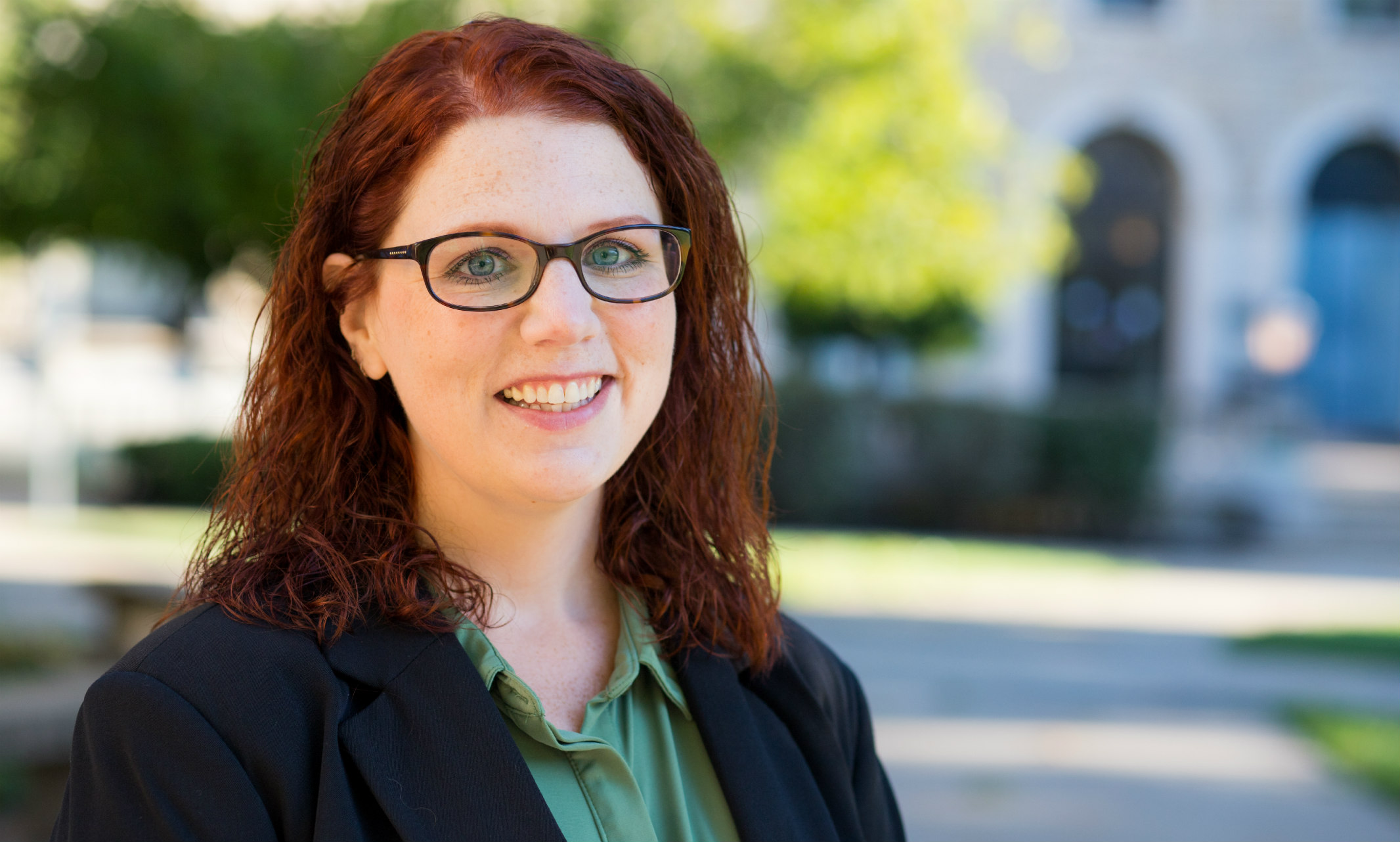
Professor Megan Hart received $354,000 from the Department of Defense to continue work on PFAS
PFAS (polyfluoroalkyl substances) solutions can be found everywhere, even in the places you least expect. It’s a lab-made compound of synthetic material that has been in use since the 1930s. Wrinkle-resistant clothing, nonstick cookware and firefighting foam are just a few of the many things that contain this material, incorporating it into our daily lives and, quietly, causing harm.
Assistant Professor of Civil and Mechanical Engineering Megan Hart received $354,000 in funding from the Department of Defense’s Strategic and Environmental Research and Development Program (SERDP) for a two-year project focused on destroying PFAS in concentrated liquid waste streams through a series of lab-based tests.
Though the actual project won’t begin until May, Hart is already hard at work conducting chemical engineering experiments in her lab as she figures out the best way to destroy the harmful material, which she said is no easy feat.
“Traditionally, people incinerate the wastes containing PFAS, but there is growing evidence that it becomes airborne and redeposits in the soil around the smelters,” Hart said.
“This is the first time a SERDP grant has been awarded at UMKC and we are very excited,” - John Kevern, civil and mechanical engineering department chair
One of Hart’s research focuses is groundwater and geochemical influences on soil stability, so she’s naturally excited by the opportunity to put on her gloves and experiment in the lab.
She developed a treatment technology that combines two major methods for PFAS removal in water – pH and free-radical destruction. The technology is engineered to release hydroxyl radicals (a type of free radical with the most active chemical properties. They have a high reaction rate and cause the most harm among the free radicals) into a solution that passes through it. Those radicals are then excited with UV light to form free radicals, which attack and destroy the PFAS in groundwater and waste water solutions. Hart says that some PFAS are easier to destroy than others but all of them are destroyed using the method she developed.
“Traditionally, people incinerate the wastes containing PFAS, but there is growing evidence that it becomes airborne and redeposits in the soil around the smelters.” - Megan Hart
Hart was able to leverage an existing relationship with Geosyntec, who funded previous work on novel remedial treatment technologies for PFAS.
“This is the first time a SERDP grant has been awarded at UMKC and we are very excited,” said John Kevern, civil and mechanical engineering department chair.
PFAS has been part of a larger conversation surrounding environmental sustainability and its negative effects on the human body. As an example of how serious the issue is, Hart mentioned an ongoing lawsuit where airline employees claim their uniforms — containing PFAS for wrinkle-resistance — are making them sick. The issue has also been raised in some ongoing presidential campaigns.
“I’m excited to start working on this project, and can’t wait to get back more results to share,” Hart said.
In addition to the SERDP grant, Hart will be working on a separate project to remove PFAS material from consumer-based products including popcorn bags that contain PFAS material to keep them from combusting in the microwave. She said that she’s equally excited to begin that work in the near future.
Explore research at UMKC
Feb 12, 2020
UMKC is seeking submissions to develop the Epperson House
The University of Missouri-Kansas City is looking for a developer that would work with the university through a public-private partnership to restore a historic home on its campus. Read the Kansas City Business Journal story.
Feb 12, 2020
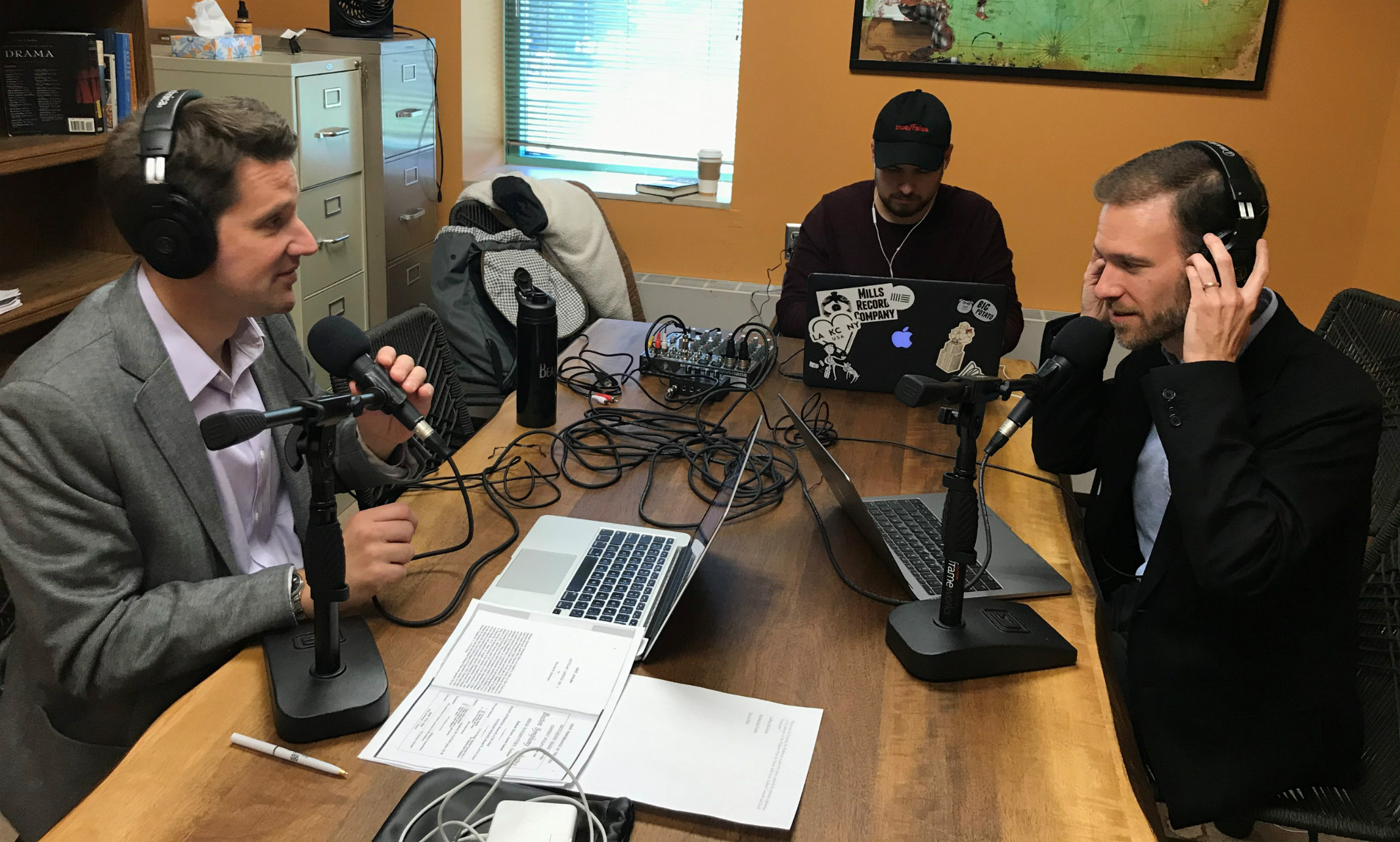
Andrew Granade and David Thurmaier invite you to join their music conversations
So, you don’t have time to read about all 73 winners of the Pulitzer Prize in Music? No problem. Just download the new podcast “Hearing the Pulitzers,” hosted by two UMKC Conservatory professors.
The first episode, which launched Feb. 1, is an introduction to the podcast and the hosts Andrew Granade, associate dean of Academic and Faculty Affairs and professor of Musicology; and David Thurmaier, chair of the Music Studies Division and associate professor of Music Theory. They gave opening thoughts on the history of the music prize and the concept and meaning of the Pulitzer Prize.
Going forward, each 30-minute episode will examine and analyze a Pulitzer Prize in Music composition and composer. The discussion, interspersed with musical segments from the award-winning piece, will review the composer’s work and why it was chosen for the award. At the end of each episode, each will share whether he thought the piece was a “hit” or a “miss” for winning the Pulitzer Prize.
“The list of winners is fascinating because it features classical music household names like Aaron Copland, Charles Ives, and Samuel Barber,” Thurmaier said, “but there are also quite a few obscure or forgotten composers that will allow us to discover new music alongside our listeners.”
Zhou Long, Bonfils Distinguished Research Professor of Composition at UMKC, was awarded the Pulitzer Prize in Music for his first opera, “Madame White Snake,” in 2011. His work will be a featured episode.
Granade and Thurmaier have been teaching together for several years and enjoy the experience of bouncing ideas off each other from their different discipline perspectives. Granade is a musicologist and researches music in its historical and cultural contexts. Thurmaier is a theorist and studies the way musicians and composers make music.
“Dave and I are both scholars of American music and were discussing, especially after Kendrick Lamar’s win two years ago, why the Pulitzers in music seemed largely irrelevant to American culture when the prizes in writing were so important,” Granade said. “That lead us to think about what we could learn about American music culture by exploring each winner in turn. We thought it might be fun to make a podcast where we could invite other people outside our classroom into the conversations we regularly have together.”
The podcast series starts with the first award in 1943, “Secular Cantata No. 2. A Free Song,” by William Schuman. It posted Feb. 8. With 73 award winners to explore, Granade said he expects the project to take three years. New episodes are available every two week. After all 73 award winners have been featured, Granade and Thurmaier will update the podcast yearly when new prize winners are announced.
Dale Morehouse, associate professor of voice-opera, recorded the introduction used for each episode. Tristan Harris, UMKC music composition undergraduate student, recorded the podcasts.
Granade and Thurmaier received a Sight and Sound Subvention from the Society for American Music to cover the costs of equipment and hosting the podcast online. “Hearing the Pulitzers” is available on iTunes, Google Play and Podbean. You can also follow “Hearing the Pulitzers” on Facebook and Twitter.
Feb 10, 2020

Mateus Borges studied mechanical engineering at UMKC from 2014 to 2015
Research and discovery is not just a goal at UMKC, it’s who we are. It’s what we do. Through hands-on learning experiences – undergraduate and graduate research, internships, volunteerism and real-world classroom assignments – our students are prepared to excel anywhere.
One-time Roo, 2014-15 mechanical engineering exchange student and agribusiness entrepreneur, Mateus Borges was listed among the 2020 Forbes Under 30 in Brazil for his entrepreneurship and innovation in helping farmers purchase fertilizer, seeds and chemicals online.
Borges credits his research experience with civil and mechanical engineering professor Travis Fields on parachute and aerial vehicle systems as the inspiration that led to his interest in using drones to support agricultural work in Brazil. Though he isn’t currently working with drone technology, Borges used his business and technology background to co-found a tech company in 2016 – shortly after graduating from the State University of Campinas – that later became Orbia, a joint venture with Bayer CropScience.
Through Orbia, medium to large-scale farmers have a seamless way to purchase the supplies they need for growing and harvesting their plants. Borges said the platform provides supplies for nearly 140,000, or 65% of the land of, soybean farmers in Brazil.
“UMKC was empowering for me to be able to use technology to solve real-world problems,” Borges says. “That changed the way I saw internships and I’m able to use that in my career path.”
Borges was part of a Science without Borders exchange program, a partnership between the School of Computing and Engineering and the State University of Campinas. He was nominated in the e-commerce and retail category of Forbes Under 30 and still has plans for his company to expand.
“Our goal is to become a global company and help reshape how agribusiness is done around the world.”
Feb 10, 2020
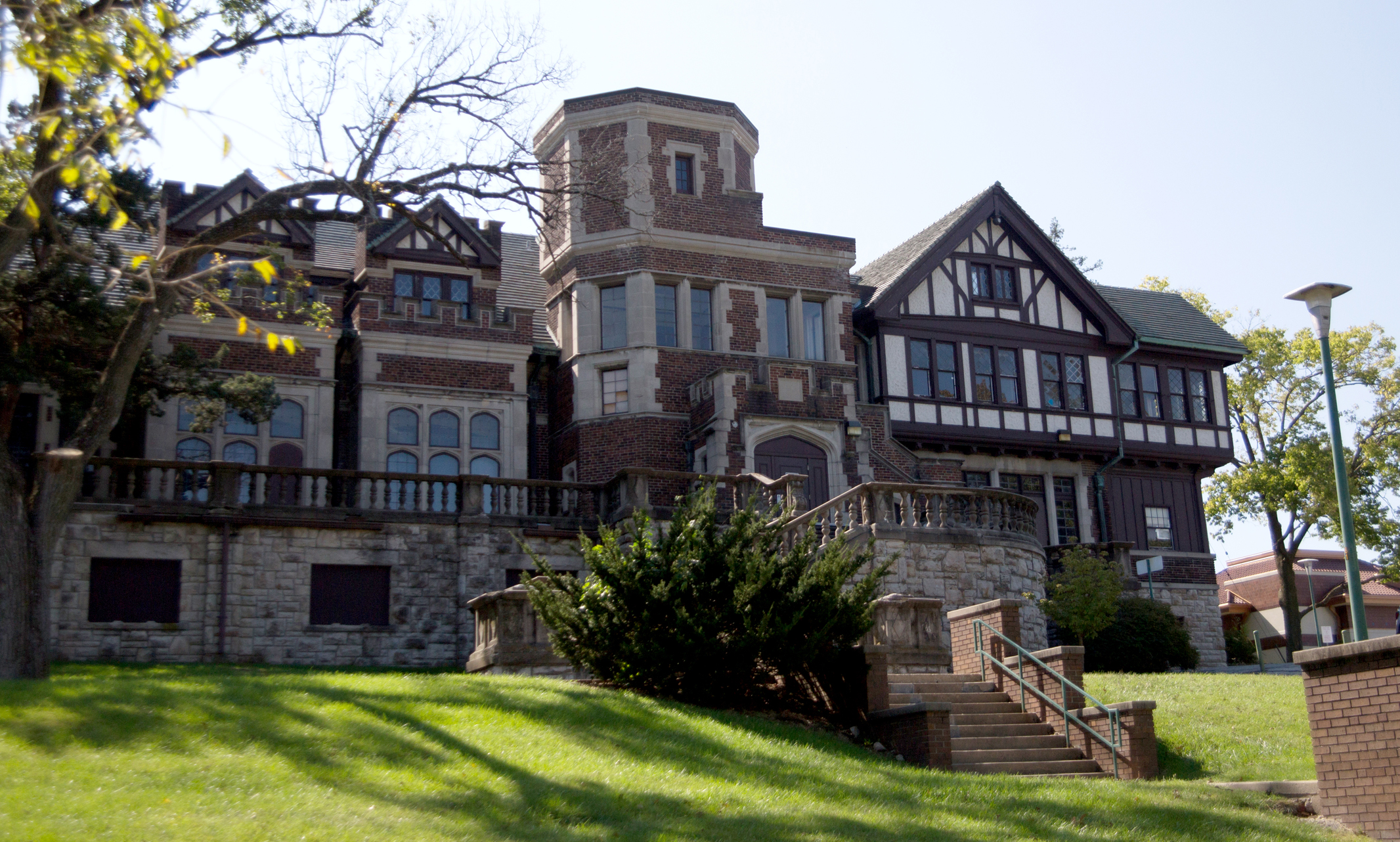
University wants to reopen century-old mansion to campus and community
The University of Missouri-Kansas City is seeking a developer to engage in a public-private partnership to restore and reopen the historic Epperson House on Volker Campus.
The Gothic Revival style mansion, designed by architect Horace LaPierre and constructed from 1919 to 1923, was originally built as a large single family home of approximately 24,000 gross square feet on five primary levels. The home originally had 54 rooms, six bathrooms, multiple elevators, a swimming pool, a billiard room, a barber shop, an organ loft and a tunnel linking the east and west basement levels.
A Request for Interest document, issued Jan. 9, seeks proposals to develop building uses and programming that support the goals of UMKC and the community and provide financial resources for the restoration and operation of the facility, plus design and construction services. Responses will be accepted through Feb. 20.
The house was acquired by UMKC (then called the University of Kansas City) in the 1940s and originally served as a dormitory for Navy pilots in World War II, then as housing for university students, then as home to a number of university schools and programs. The building has been closed since 2011.
The Request for Interest calls for proposals “to complete the historic restoration of the Epperson House exterior, interior public spaces and grounds; along with a strategic renovation and repurposing of the private spaces for compatible market-rate revenue-generating office or hospitality uses that support the urban engagement mission of UMKC, the desire of the community to see the house restored and the interests of the developer while covering the operating costs of the facility.”
Interested parties should contact Robert A. Simmons, associate vice chancellor for administration, at simmonsr@umkc.edu or 816-235-1354.
“One of our responsibilities as a public university is to be proper stewards of our legacy. Epperson House is a treasure for not just our campus, but for the Kansas City community,” said Chancellor Mauli Agrawal. “With this invitation, we are seeking a team of partners to work with us to bring that prominent and grand building back into the daily life of our campus and our community.”
Feb 10, 2020
UMKC political science chair says traditional primaries have their drawbacks
While caucuses can cause issues, UMKC Political Science Chair Greg Vonnahme explained on KCTV5 that traditional primaries also have their drawbacks.
Feb 08, 2020
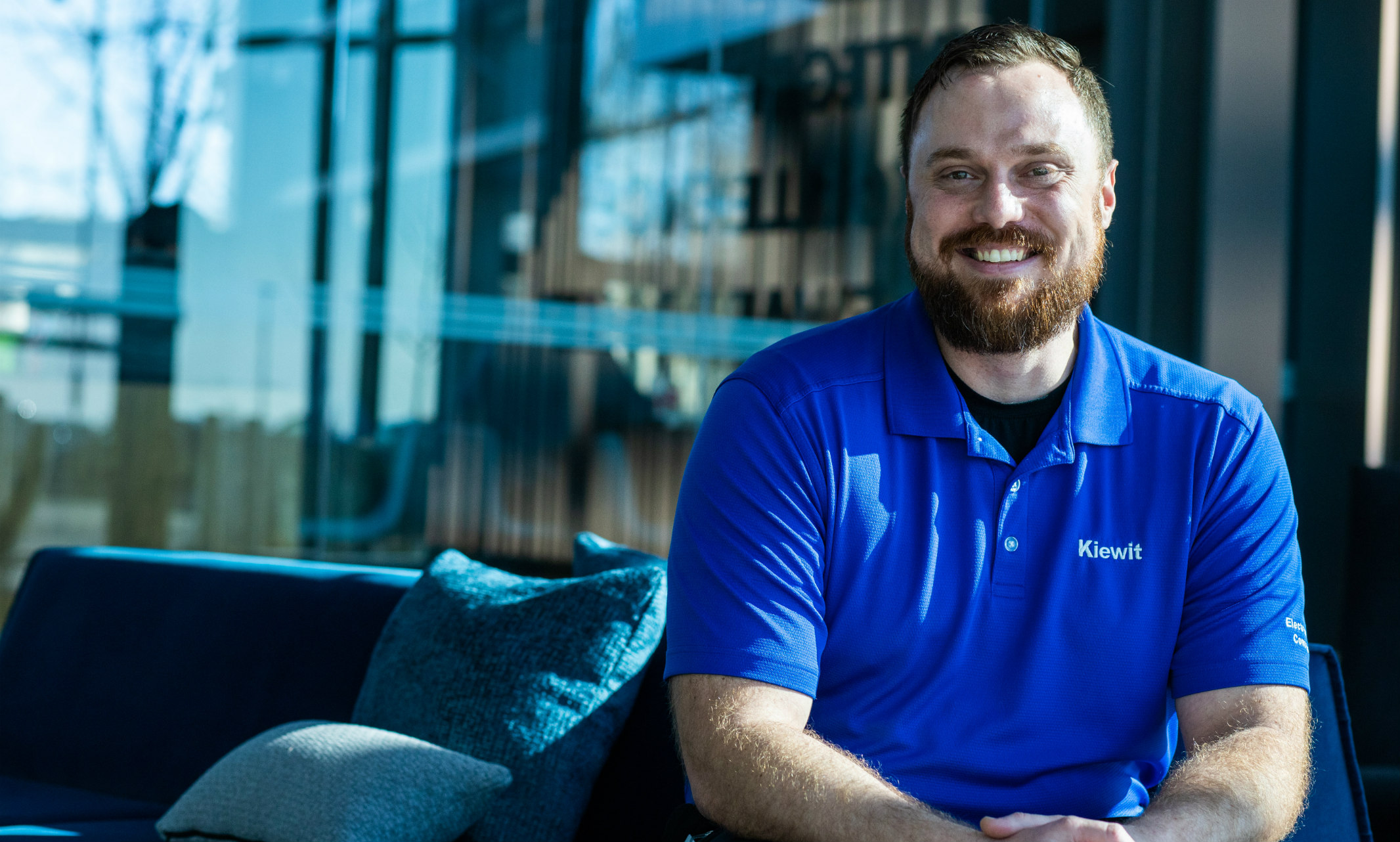
Jason Painter builds solid future for his family and future students
Our ongoing story starts with people from around the world, converging here at UMKC. Get to know our people and you'll know what UMKC is all about.
Jason Painter '12
Academic Program: Bachelor of Science, Mechanical Engineering
Hometown: North Kansas City, Missouri
Jason Painter (BSME ’12) always liked school, and math was his strong point. But following high school graduation, he decided college wasn’t for him. He married his high school sweetheart and started working in residential construction. But after a few years, he began to reconsider his decision to forego a college degree.
“I felt like I was failing,” Painter says. “I went through a spiritual awakening and realized college was the answer.”
Painter talked to his wife, Tiffany, and she was supportive, even though it meant Jason would have to work nights and go to school during the day to make it happen. But the couple agreed college was the right decision and that they needed to stay close to home.
“We weren’t going to uproot our family, so I went to visit UMKC. I fell in love with the campus the first time I walked around.”
While the Painters were committed to his getting his degree in engineering, the reality was more challenging than they anticipated.
“Going to work, going to school and having a family at the same time was incredibly emotional and physically and mentally draining.”
Painter was a third-shift janitor at an elementary school. He did his homework in a closet during his breaks.
“I am so glad I had the opportunity to go to school, but the saddest part was coming home at 5 or 6 o’clock in the morning when my wife was getting ready to leave for work. I’d be able to see my son for five minutes.”
While it was a challenging situation for his family, was it justified?
“Absolutely. Hard – but worth it.”
Experiencing this challenge inspired Painter to give back, even while he was in school. UMKC Missouri Society of Professional Engineers coordinator Jane Vogl recalls that he invigorated the MSPE student chapter while he served as president.
“He tripled the membership and was always looking for ways for the SCE engineering students to gain hands-on knowledge through field trips to super structures,” Vogl says. “He arranged visits to the Harry S. Truman Dam in Warsaw, Missouri and the Iatan Power Plant in Weston.”
In addition, Painter volunteered for competitions and the E-Week blood drive.
His giving did not stop when he graduated. Painter has recently established a $5,000 scholarship for non-traditional students in engineering.
“Knowing that there are other people who are struggling inspired me to give back,” Painter says. “I had people cut me down and tell me I couldn’t do it. But I had a lot of help from my professors. I graduated cum laude. Sometimes, I can’t believe I got through it. I just want to help other people.”
Dahn Phan is the first recipient of the Jason and Tiffany Painter Scholarship. Phan is a non-traditional student who is studying electrical and computer engineering.
“My family immigrated to the United States during the Vietnam War with nothing besides the clothes on their back hoping for a fresh start to life,” Phan says. “Growing up, my parents did everything they could to provide food on the table and to give me and my brothers the necessities to succeed in life. With their sacrifice and dedication, I am proud to say I will be part of the first generation graduating from college.”
“I had people cut me down and tell me I couldn’t do it. But I had a lot of help from my professors. I graduated cum laude. Sometimes, I can’t believe I got through it. I just want to help other people.” -Jason Painter
Painter’s scholarship helped make that success possible.
“Receiving this scholarship motivated me to maintain my GPA and has given me the opportunity to complete my final semester in engineering school,” Phan says. “I’ve been able to take time off of work and be more involved with school organizations and activities. This helped me build leadership and team-working skills, which I knew employers wanted.”
Phan met Painter during the School of Computing and Engineering scholarship luncheon last semester and they had the opportunity to learn more about each other’s families and their personal paths.
“I got to know a little more about Jason’s family and his history as a non-traditional student. After meeting him and learning that he works as a controls engineer at Kiewit, he inspired me to becoming a controls engineer as well.”
Phan is anticipating graduating this spring. He has accepted a job with the Global Product Development Division of General Motors in Detroit.
Painter’s future is also bright. He is in the midst of a 2-3 year power plant project at Kiewit. His goals are both simple and significant.
“I feel as if I made it already!” he says. “My goal is to be a good father and be there for my son. I missed out on a lot of the early years. My wife deserves a lot of the credit. She gave me constant affirmation that it would all be worth it. I’m just looking forward to our life together.”
Feb 07, 2020
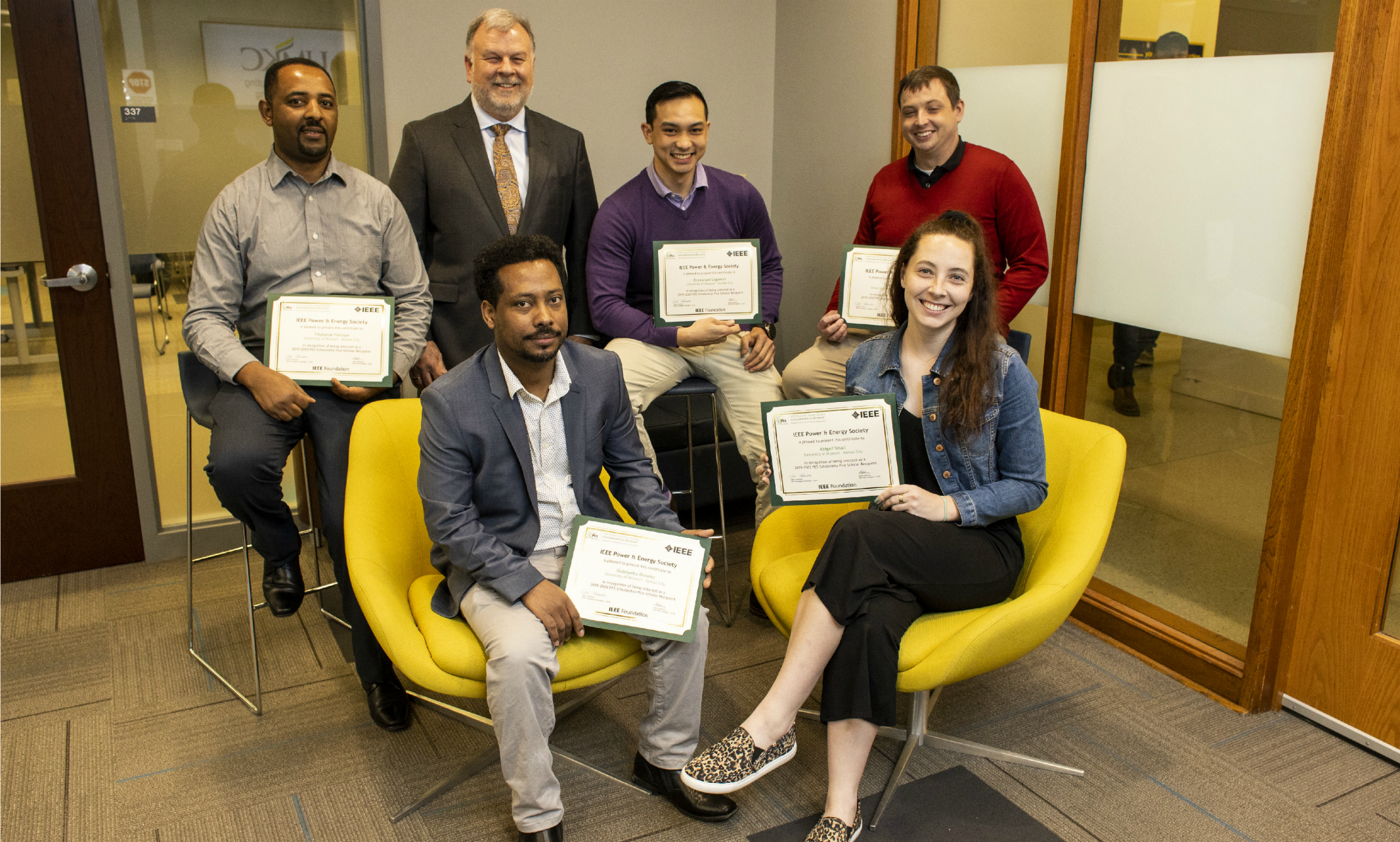
Eight from UMKC were selected to receive $7,000 in scholarship funding over the course of three years
The University of Missouri-Kansas City School of Computing and Engineering has more IEEE (Institute of Electrical and Electronics Engineers) Power and Engineering Society scholarship recipients than any other school in the country. 135 students — eight from UMKC — across the United States were selected to receive $7,000 in scholarship funding over the course of three years to help defray educational costs.
“It's a great honor — 'a feather in our cap,' as the saying goes — for us to have eight PES Scholars within the School of Computing and Engineering, the largest number of scholarships among all US engineering programs. IEEE is highly regarded within the engineering community around the world, and this accolade speaks to the quality of education we provide our students at UMKC,” said SCE Dean Kevin Truman.
The goal of the IEEE PES Scholarship Plus Initiative is to encourage undergraduate students to pursue careers in power and energy engineering. In addition to scholarships, the program also facilitates internship/co-op experiences, mentorship opportunities and special recognition as a PES Scholar. Scholarship amounts are $2,000 for the first two years and $3,000 the third year.
Feb 07, 2020
KCUR leads community engagement efforts as part of 2020 election season
As the election season kicks off, the “America Amplified: Election 2020” initiative, led by KCUR 89.3, a service of University of Missouri-Kansas City, announces eight public media networks that will produce innovative journalism from community engagement efforts. Yahoo Finance reported the story $1.9M ‘America Amplified: Election 2020’ initiative announces partner stations.
This story was also picked up by Investor Network.
Feb 04, 2020

UMKC joined in the celebration of the Kansas City Chiefs winning the Super Bowl
The UMKC victory tweet for the Kansas City Chiefs was featured.
‘Meant to be’: Leaders, celebrities react after Chiefs’ Super Bowl victory
KSHB – February 2, 2020
Feb 02, 2020
UMKC law student Hannah Bassham was a sideline reporter for the Kansas City Chiefs’ Super Bowl victory.
University of Missouri-Kansas City law student Hannah Bassham had a sideline view of the Kansas City Chiefs’ Super Bowl victory over the San Francisco 49ers on Feb. 2. Missouri Lawyers Media reported the story ‘The greatest experience of my life’: UMKC Law student doubles as Super Bowl broadcaster. (Subscription required)
Feb 02, 2020
